‘Set modal shift target for public transport’
Campaign for Better Transport this week published its General Election Manifesto which contains its transport asks for the next government
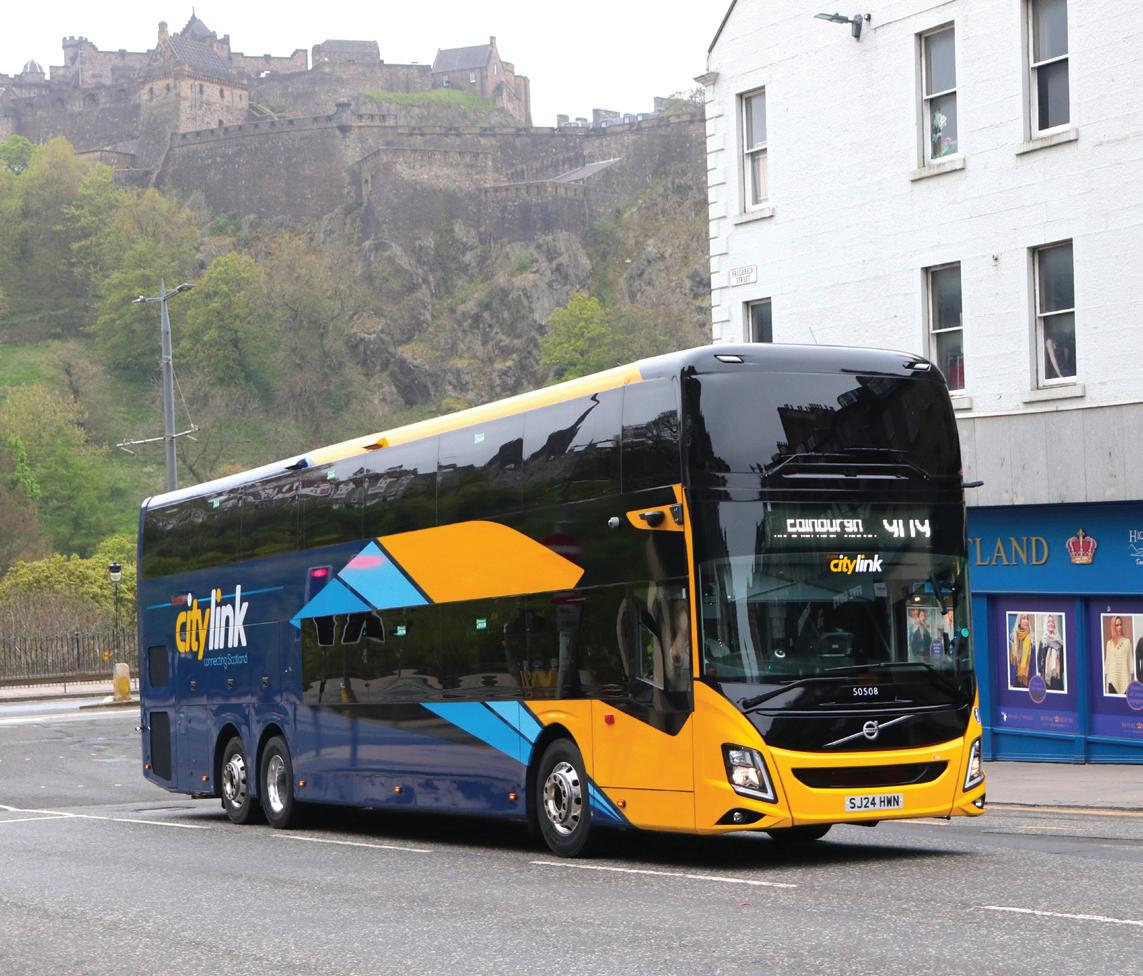
The next government should commit to a target for modal shift to public transport and active travel. This is one of a number of suggestions made by Campaign for Better Transport in its General Election Manifesto, which was published last week.
Silviya Barrett, director of policy and research at Campaign for Better Transport, commented: “Prioritising investment in public transport, shared travel, walking and cycling with a commitment to reduce the number of car journeys should be a priority, for the sake of communities, the economy and the planet.”
FULL STORY ON PAGE 9
We want your views on transport
The State of UK Public Transport 2024 survey will access the mood within the sector in data-driven public transport solutions. Your thoughts on the short and long-term prospects for public transport, particularly in light of the National Bus Strategy for England, are not just valuable, but influential. We are also interested in your views on how data and technology can shape the future of the industry.
As the UK approaches a pivotal general election on July 4, it’s important to gauge the mood within the passenger transport sector. The time is right for PassengerTransport to conduct its third ‘State of UK Public Transport’ survey of passenger transport professionals. Your insights are crucial to understanding this vital sector’s current mood and future trajectory. We are conducting this survey in partnership with CitySwift, a leader
Commenting on the survey, PassengerTransport editor Robert Jack said: “Our previous surveys revealed the views of passenger
transport professionals as we emerged from the pandemic. As the sector enters a new era we think the time is right to conduct a new survey on the state of UK public transport.
“Your feedback will be invaluable in painting a comprehensive picture of public transport in the UK.”

EVERY FORTNIGHT ISSUE 315 14 JUNE 2024 NEWS, VIEWS AND ANALYSIS FOR A SECTOR ON THE MOVE
A Volvo 9700 double-deck coach in Edinburgh
Council for Net Zero Transport formed Experts will support next government 13 ‘Battery trains are ready to replace diesel’ Siemens believes it has the solution 06 NXWM tickets now sold on Citymapper All-in-one plan, pay and ride experience 15 The good, the less good and the ugly Alex Warner’s half-term report 18 One size does not fit all Bus franchising may not be for everywhere 22 NET ZERO NEWS COMMENT COMMENT HAVE YOUR SAY Scan the QR code for the State of
Transport 2024 survey INNOVATION & TECH
Public
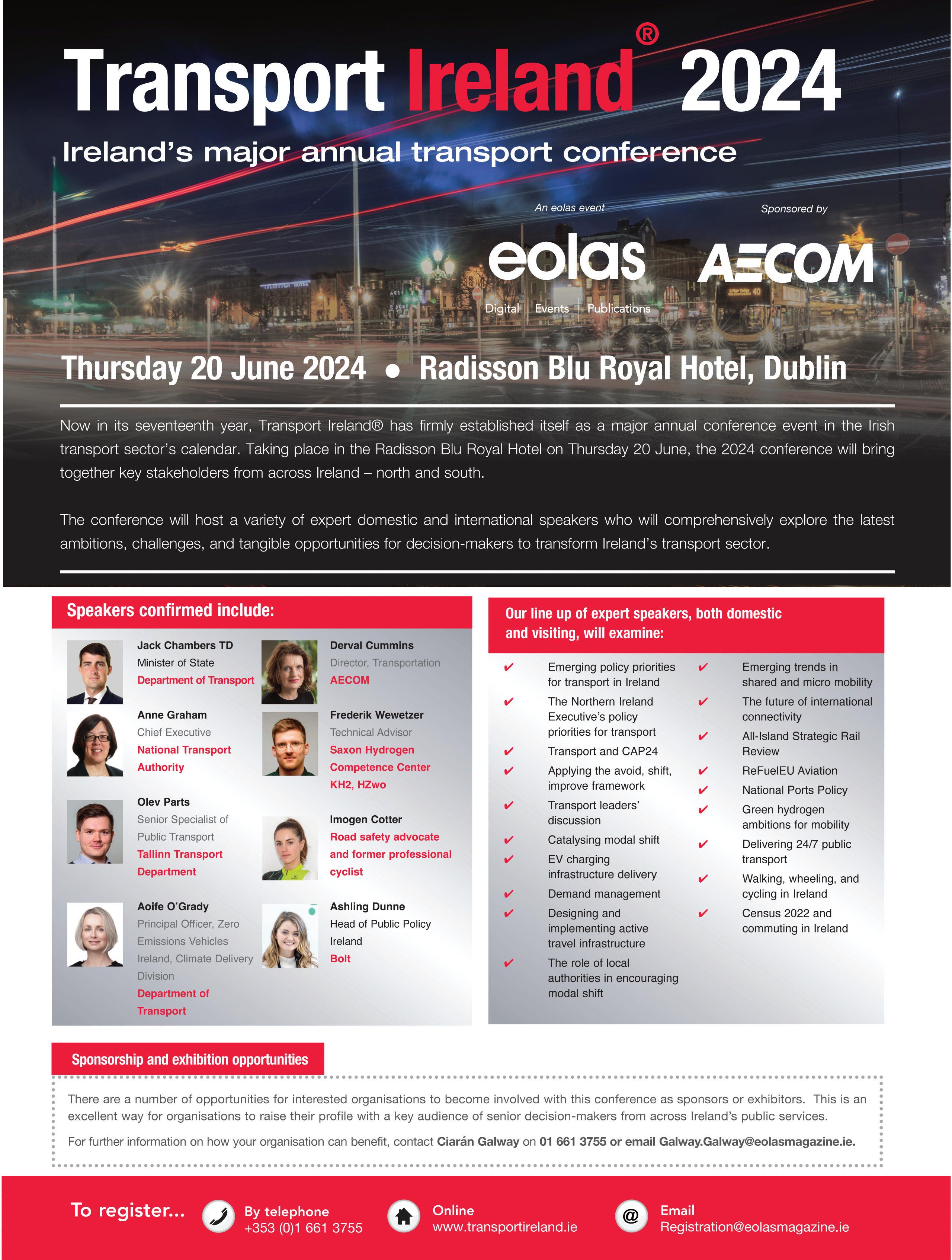
Bus timesjourneycannot be allowed to keep rising

Robert
You wait ages for an intervention from Professor David Begg on buses - and then two arrive at once!
Last month the former chair of the Commission for Integrated Transport emerged from his selfimposed exile to speak at a conference in London. There he warned that transport policy has gone backwards over the past decade. Then, last week, he popped up in his home city of Edinburgh to warn that the city needs to future-proof its bus network against congestion (see page 8).
Begg recalled the report he published eight years ago in June 2016 for Greener Journeys - The impact of congestion on bus users - which examined the close correlation between declining bus speeds and passenger numbers. It’s depressing to note that these trends have been allowed to continue in many parts of the country. In Edinburgh, for example, bus journey times continue to increase as a result of congestion - by nearly 20% in the last 10 years on certain corridors.
North and south of the border, the National Bus Strategy for England and Scotland’s £500m Bus Partnership Fund were supposed to address the issue of declining bus speeds. The former is without a champion and the latter has been “paused” due to budget constraints.
After more than half a century of failure, bus users are within their rights to at least demand no further lengthening of journey times. Local authorities should be compelled to publish data on bus journey times so that progress - or lack thereof - can be scrutinised.
IN THIS ISSUE
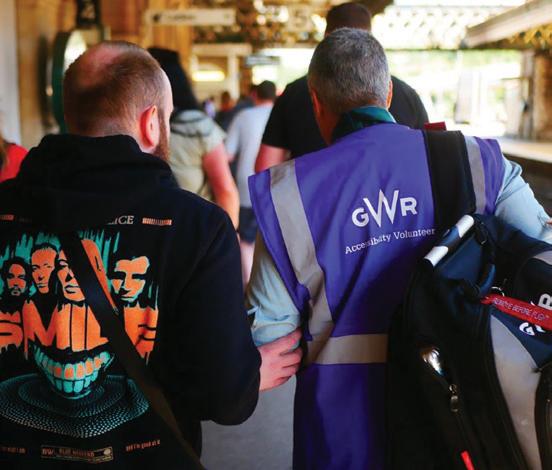
ORGANISATION PAGE
20 DO WE NEE D TO GO BACK TO BASICS?
Attracting new users sometimes requires an explanation of the basics. “There are people well into middle age who have no relationship with trains or buses because they have driven or been driven everywhere,” says Nick Richardson
04 FIRST HAILS PROGRESS D ESPITE SLI D E INTO LOSS
FirstGroup has reported a significant profit increase, driven by a rebound in patronage and improved margins across its rail and bus operations. However, it revealed a statutory loss as a result of the company’s exit from legacy pension schemes.
16 NTS REVEALS BIG SHI F TS IN BUS TRIP-MAKING
Analysis of the latest National Travel Survey shows there has been a huge reduction in trip rates amongst women and older people since Covid. “Changes in demand for bus travel induced by the pandemic have settled into a pattern,” says Chris Cheek
25 T RANSPORT IS THE D OG THAT HASN’T BARKE D Great Minster Grumbles: Our Whitehall insider imagines what’s going on inside the minds of the mandarins at Great Minster House, home of the DfT. “I can’t wait to see how Labour’s relationship with the metro mayors plays out.”
TRANSPORT
Telephone: 020 3950 8000
Editor & Publisher Robert Jack Deputy Editor Andrew Garnett
Writer Rhodri Clark Directors Chris Cheek, Andrew Garnett, Robert Jack OFFICE CONTACT DETAILS Passenger Transport Publishing Ltd PO Box 5496, Westbury BA13 9BX, UNITED KINGDOM Telephone (all enquiries): 020 3950 8000 EDITORIAL editorial@passengertransport.co.uk ADVERTISING ads@passengertransport.co.uk SUBSCRIPTIONS subs@passengertransport.co.uk ACCOUNTS accounts@passengertransport.co.uk
Subscription rates per year;
£140
Royal Mail post); Worldwide
part of this publication may be reproduced in whole or in part without the publisher’s written permission. Printed by Cambrian Printers Ltd, Stephens & George Print Group, Goat Mill Road, Dowlaid, Merthyr Tydfil CF48 3TD © Passenger Transport Publishing Ltd 2024 ISSN 2046-3278 SUBSCRIPTIONS HOTLINE 020 3950 8000 PASSENGER TRANSPORT PO Box 5496, Westbury BA13 9BX 020 3950 8000 editorial@passengertransport.co.uk CONTENTS www.passengertransport.co.uk 14 June 2024 | 03 REGULARS NEWS 04 NET ZERO 13 INNOVATION & TECH 15 COMMENT 18 GRUMBLES 25 CAREERS 26 DIVERSIONS 28
Jack Managing Editor PASSENGER
editorial@passengertransport.co.uk forename.surname@ passengertransport.co.uk
Managing
Contributing
Passenger Transport is only available by subscription.
UK
(despatch by
(airmail) £280 The editor welcomes written contributions and photographs, which should be sent to the above address. All rights reserved. No
Alexander Dennis 5 Arriva 4 Arriva Cymru 11 Avanti West Coast 7 Brighton & Hove 5 Campaign for Better Transport 1, 9 Cardiff Bus 10 Chiltern 6 City of Edinburgh Council 8 CitySwift 1 CPT Cymru 11 Deutsche Bahn 4 East West Railway 6 Elizabeth Line 4 First Bus 4 FirstGroup 4 Great British Railways 7, 10 Great Northern 7 Great Western Railway 6, 7 Gwynedd Council 11 I Squared Capital 4 Keolis 4 Lothian Buses 5, 8 Lumo 4 Nexus 6 Northern 6 Reading Buses 5 ScotRail 6, 7 Siemens Mobility 6 Stadler 6 Stagecoach North East 5 Tees Flex 5 Transdev Blazefield 9 TransPennine Express 6 Transport for London 4 Transport for Wales 10, 11 Transport for Wales Rail 6 Tyne and Wear Metro 6 HAVE YOUR SAY Contact us with your news, views and opinion at:
editorial@passengertransport.co.uk
NEWS ROUND-UP
First hails progress despite slide into loss
Operating profits up, but loss accrued due to legacy pension fees
FINANCIALS
FirstGroup has reported a significant profit increase, driven by a rebound in patronage and improved margins across its rail and bus operations.
In the 12 months to March, the company’s revenues slightly decreased to £4.7bn. However, its adjusted operating profit surged by 26.9% to £204.3m. This rise was attributed to an “extra week of trading and receipt of higher than accrued variable fees in First Rail [the year before]”.
Despite the positive financial performance, FirstGroup reported a statutory loss of £24.4m, a significant drop from the £128.7m profit the previous
DB FINALISES ARRIVA SALE
€1.6bn deal to buy group from DB completed
ACQUISITIONS
Arriva has announced the completion of its acquisition by I Squared Capital from German stateowned rail operator Deutsche Bahn. The deal first announced in October 2023, encompasses all of Arriva’s businesses across 11 countries.
When the deal was announced, I Squared pledged to invest more than €2bn in growing and electrifying Arriva’s fleets. Financial terms have not been disclosed, but reports suggest the deal is worth about €1.6bn including debt.
I Squared is based in Miami and has investments in what it terms
year. This loss was primarily due to non-cash charges of £146.9m, which were incurred as a result of the company’s exit from two local government pension schemes and the legacy Greyhound scheme.
The Aberdeen-based group saw an increase in rail journeys, recording 274 million last year, up from 263 million in the previous financial year. Daily bus journeys also rose to 1.14 million from 1.07 million over the same period, although service miles operated dropped to 167 million from 168 million in 2023.
The group highlighted that
“We have made considerable progress”
Graham Sutherland
“essential infrastructure”, including transport, logistics, energy, utilities, and digital infrastructure around the world. It has assets of $38bn.
“Closing this transaction marks an important milestone and an exciting new chapter,” said chief executive
its open access rail operations performed ahead of expectations underpinned by strong demand and effective yield management. London to Scotland open access operator Lumo has now carried more than 2.5 million passengers since its launch in October 2021. The group is also bidding for other open access opportunities.
Financial performance at the contracted rail operations was ahead of expectations due to higher than accrued final variable fee awards. Meanwhile, First Rail has been awarded an eight-year contract to operate the London Cable Car by Transport for London and the group has been selected as one of four bidders, alongside partner Keolis, to bid for the Elizabeth Line contract.
FirstGroup’s adjusted operating margin improved to 4.3%, up
Mike Cooper. “It is an opportunity for Arriva to recommit to working alongside passenger transport authorities to deliver essential transport links and build a more sustainable future for our colleagues, customers and the communities
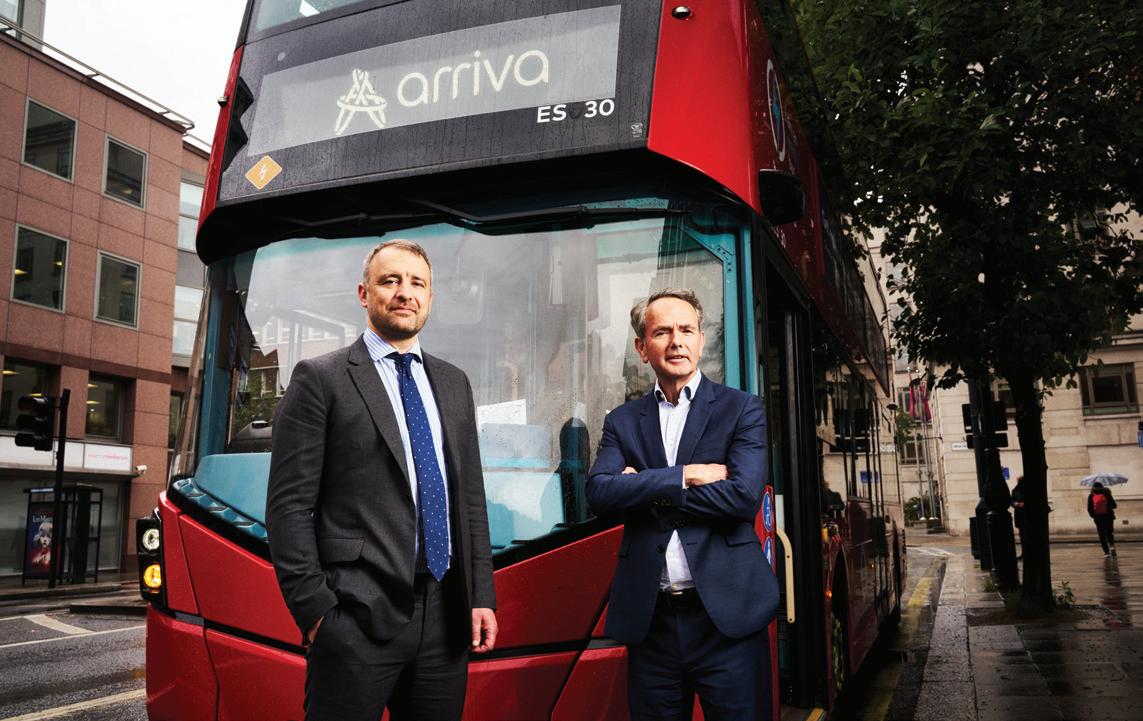
from 3.2% the previous year, with significant gains at FirstBus. FirstBus’s margins increased to 8.3% from 6.5% in the previous financial year, driven by “increased passenger volumes, improved driver availability, and data-led operational and commercial improvements”, which offset inflationary pressures and weaker government funding.
FirstGroup expects FirstBus’s adjusted operating profit margin to reach 10% in the first half of the current year, thanks to further productivity improvements and lower costs from electrification. The group ended the year with adjusted net cash of £64.1m, down from £109.9m the previous year.
“We have made considerable progress in our financial and operational performance,” said chief executive Graham Sutherland. “ This is testament to the resilience and capability of our people across the group and leaves us well positioned to grow and create further value for all our stakeholders.”
we serve. With the backing of I Squared, an independent and highly reputable infrastructure investor, I am confident that we will deliver on that commitment for the benefit of the millions that Arriva serves”. Enrico Del Prete, I Squared fund partner, added: “Decarbonising public transport is one of the next big challenges in the energy transition and we are excited to work with Arriva to provide the support and investment that will help the company achieve its vision of cleaner cities and greener public transport networks. We see genuine growth potential that can be unlocked at Arriva over the long-term. We are excited for what comes next and look forward to working with the whole Arriva team as we capitalise on the opportunities in the sector together.”
Enrico Del Prete (left) with Mike Cooper
04 | 14 June 2024 www.passengertransport.co.uk
Tees Flex DRT service costs £100k per month
Demand responsive service racks up subsidy of £14 per trip
DRT
Figures disclosed by the Tees Valley Combined Authority reveal that the Tees Flex demandresponsive minibus service requires a public subsidy of over £14 per trip.
The flagship scheme, launched in 2020 as a three-year pilot project with operator Stagecoach, aims to connect people in rural areas to economic centres, facilitating access to jobs and services. Following the pilot’s completion, Tees Valley mayor Ben Houchen subsequently confirmed an 18-month extension of the service in February 2023. Recent figures show that, while patronage grew strongly in the early days following its launch, the service averaged around 7,150 monthly trips between April 2023 and March 2024, up slightly from
ADL LANDS MAJOR READING ORDER
Council-owned firm makes investment in 53 new buses
MANUFACTURERS
Council-owned operator Reading Buses has announced a significant investment in future vehicles as the Reading Climate Festival begins. The company has signed contracts with manufacturer Alexander Dennis to purchase 53 new buses, which will enter service between October 2024 and June 2025.
This order includes 21 highspecification diesel-powered Enviro400 double deckers for the
the 7,070 trips recorded in 2022-2023.
“Overall satisfaction with Tees Flex is high,” said Alan Weston, the combined authority’s head of transport. “Between April 2023 and March 2024, the average satisfaction rating was 4.9 out of 5, up from 4.8 in 2022-23.”
However, in response to a public question, combined authority officials disclosed that the
service operates under a monthly contract price of £100,478.50, a significant figure that reflects the cost of maintaining the service.
“Tees Flex is a subsidised bus service that was introduced to provide coverage in areas with limited commercial bus service coverage,” said officials. “Providing bus services in areas that are not commercially viable requires public subsidy.”
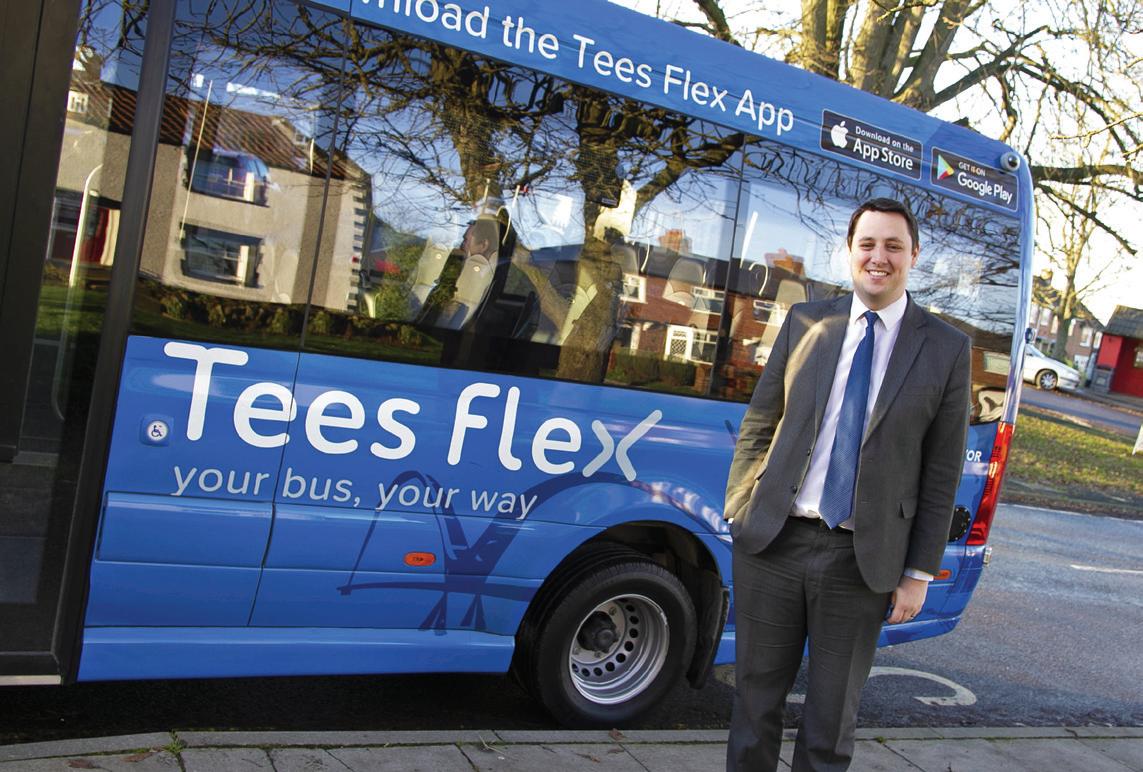
main Reading Buses fleet. They will arrive between October and December this year for longerdistance routes. Seven of these will be allocated to the interurban route between Reading and Newbury, while additional buses will support recent timetable enhancements on London Line 702 and Flightline 703 services. The remainder will be painted in the operator’s silver ‘generic’ colours for use on any route.
Meanwhile, in October, eight new Enviro200 single deckers will arrive at Newbury & District, completely renewing the local fleet for the first time since Reading Buses acquired the company in 2018.
IN BRIEF
EXPRESS ROUTE CONFIRMED Brighton & Hove has confirmed plans to launch a new express service between between Mile Oak and Brighton Marina. Starting on July 7, Route 1X will replace the operator’s Route 1A and offer fast connections by offering a limited stop alternative to the existing Route 1. Brighton & Hove said passengers will be able to spot Route 1X stops due to the bright pink bus stop poles.
LOTHIAN’S CHEAPER FARES Lothian has announced changes to fares in west Edinburgh which will see price reductions for many customers from June 30. It will see the Lothian Country ‘cityWEST’ zone become an extension of the ‘city’ fares zone, with adult single tickets for Queensferry, Newbridge and Dalmahoy to Edinburgh city centre reduced to £2.00. A variety of day and family tickets will now also be valid in cityWEST zones. The move has been made by Lothian as a result of sustained customer growth on the local network.
Finally, in June 2025, Reading Buses will introduce 24 zero-emission next generation Enviro400EV electric double deck buses for the Purple 17 and Claret 21 routes in Reading.
Robert Williams, the operator’s chief executive, said passenger comfort will be improved with the new buses as they will feature a heat pump for full air conditioning in summer and heating in winter.
“We have been undertaking extensive testing of demonstrators from a number of suppliers,” he added. “The two things of paramount importance were the experience for the customers and experience for our drivers, before we considered
the technical side of things. Of all the demonstrators, the new Enviro400EV has the best layout for customers on board, and the drivers who tested it were very impressed.”
The introduction of these electric buses is funded through the government’s ZEBRA 2 scheme, covering 75% of costs, with Reading Buses covering the rest. The depot will be upgraded with 13 fast chargers, each capable of charging two vehicles simultaneously.
This investment also enables Reading to cascade its existing compressed natural gas (CNG) buses to replace the oldest diesel buses in the fleet.
www.passengertransport.co.uk 14 June 2024 | 05
Ben Houchen confirmed the extension of Tees Flex in early 2023
Siemens claims battery trains could save £3.5bn
Manufacturer has the answer to costly electrification projects
INFRASTRUCTURE
Siemens Mobility has calculated that its new battery-electric multiple unit (BEMU) could save Britain’s railways over £3.5bn in infrastructure costs and reduce CO2 emissions by 12 million tonnes over 35 years.
The BEMU Desiro Verve, which could be assembled at Siemens’ new facility in Goole, is proposed as a replacement for ageing diesel multiple unit fleets operated by Chiltern, Great Western Railway, Northern, ScotRail, TransPennine Express, and Transport for Wales Rail. All of these operators have plans to procure new rolling stock in the coming years.
The units would use overhead wires on electrified routes and switch to battery mode on non-electrified sections. This
ELECTION DELAYS CONSULTATIOD
East West Rail has planned to consult in June on plans
PROJECTS
The East West Railway company has delayed the start of its statutory consultation programme to comply with pre-election guidelines. It has also postponed the remaining ‘Community Conversations’ events in Bletchley and Marston Moretaine, which were meant to inform residents about the Development Consent Order (DCO) process and how they could participate.
“Following the announcement
means only small sections of routes or specific stations need to be electrified with overhead line equipment (OLE), making the replacement of diesel trains quicker and less disruptive than full route electrification.
This OLE can also be installed much more quickly using Siemens Mobility’s new Rail Charging Converter (RCC), which allows direct connection to the domestic grid. This could reduce the delivery time for OLE from seven years to as little as 18 months.
Sambit Banerjee, joint chief executive for Siemens Mobility UK & Ireland, said: “Britain should never have to buy a diesel passenger train again. Our battery
“Britain should never have to buy a diesel train again” Sambit Bannerjee
of a general election in July, and so that we comply with preelection guidelines, our statutory consultation will now not be able to begin in June as originally planned,” said EWR in a statement. “We will, of course, update you about the next steps as soon as we can.”
The statutory consultation would have allowed stakeholders and residents to provide feedback on the DCO, the plans for the new railway between Bedford and Cambridge, and improvements to the existing railway between Oxford and Bedford.
This process would have included sharing details about the proposed route design.
trains, which we’d assemble in our new Goole factory in Yorkshire, can replace Britain’s ageing diesel trains without us having to electrify hundreds of miles more track in the next few years. So, on routes from Perth to Penzance, passengers could be travelling on clean, green battery-electric trains by the early 2030s. And the best thing is that this would save the country £3.5bn over 35 years.”
Siemens has identified points across the network where discontinuous overhead lines could be installed along with RCCs. These would connect to the local electricity distribution network at 11kV, significantly reducing installation time compared to the typical 375/400kV connection.
Using this approach, Siemens believes it can help save significantly on infrastructure costs and support the government’s aim to remove diesel-only trains by 2040.
METRO FLEET AT HALFWAY POINT
Stadler reaches milestone in new train programme
LIGHT RAIL
The £362m programme to build a new fleet of trains for the Tyne and Wear Metro has reached its halfway point. Swiss train manufacturer Stadler has completed 23 of the 46 trains on order, with seven already delivered and more to follow.
This milestone coincides with the new Metro trains entering a phase of daytime test runs in preparation for their entry into service later this year. Daytime testing began last month
THE END IS NIGH FOR ‘MAGSTRIPES’
Northern suggests paper tickets are on the way out
TICKETING
Train operator Northern predicts the orange paper ‘magstripe’ train ticket could become a museum exhibit within five years due to the increasing preference for digital alternatives.
The TOC has reported a significant decline in the use of ‘magstripe’ tickets, with 2.3 million fewer used in the past year. In 2023-24, less than 20% of journeys on Northern services were made with a ‘magstripe’ ticket, a 12% decrease from the previous year, dropping from 20.3 million to 18 million.
Conversely, the adoption of digital tickets on Northern services has surged, growing by almost 19% over the same period, from 54.8 million to 65.2 million.
“At the current rate of decline and with an ever-greater focus on digital and paper alternatives, ‘magstripes’ are definitely nearing the end of the line,” said a spokesperson for the train operator. “They could be something of a museum exhibit within five years.”
with a new train operating between timetabled services on Metro’s coastal route between Newcastle and North Tyneside.
The daytime tests involve kilometre accumulation where the trains are put through their paces by simulating passenger service and follows an extensive night-time testing phase.
Michael Richardson, head of fleet and depot replacement programme at operator Nexus, said: “The testing of the new Metro trains continues on our network. We are making good progress and were aiming to get the first trains into customer service later in the year.”
NEWS ROUND-UP 06 | 14 June 2024 www.passengertransport.co.uk
Scottish concerns over rail reform plans
Bill could risk accountability to Scottish Parliament
RAIL REFORM
Despite the likelihood of the rail reform bill being shelved due to prime minister Rishi Sunak’s decision to call a general election, MPs were cautioned before parliament dissolved that the proposed rail reform could favour England at Scotland’s expense.
At a hearing of the transport select committee last month, Scottish transport minister Fiona Hyslop cautioned that the bill could “complicate things”.
“It will make things more difficult for us and more remote, and take away - in fact, damagethe devolution that we currently have,” she said. “What you see in front of you is a draft bill that will deliver for England. It is a more integrated aligned railway,
bringing together responsibilities for track and train in a single body, which is a step forward for the industry there.
“However, what we face with the bill is the prospect of unnecessary and inefficient complication of Scotland’s railway with a new body. It will be more distant from Scottish ministers; there will be no statutory responsibilities.”
Hyslop said the bill proposed a new body to oversee track and cross-border services exclusively. Scottish ministers would still set strategy and manage passenger services, but the draft bill only allows for greater integration in
“It will... damage the devolution that we currently have”
Fiona Hyslop
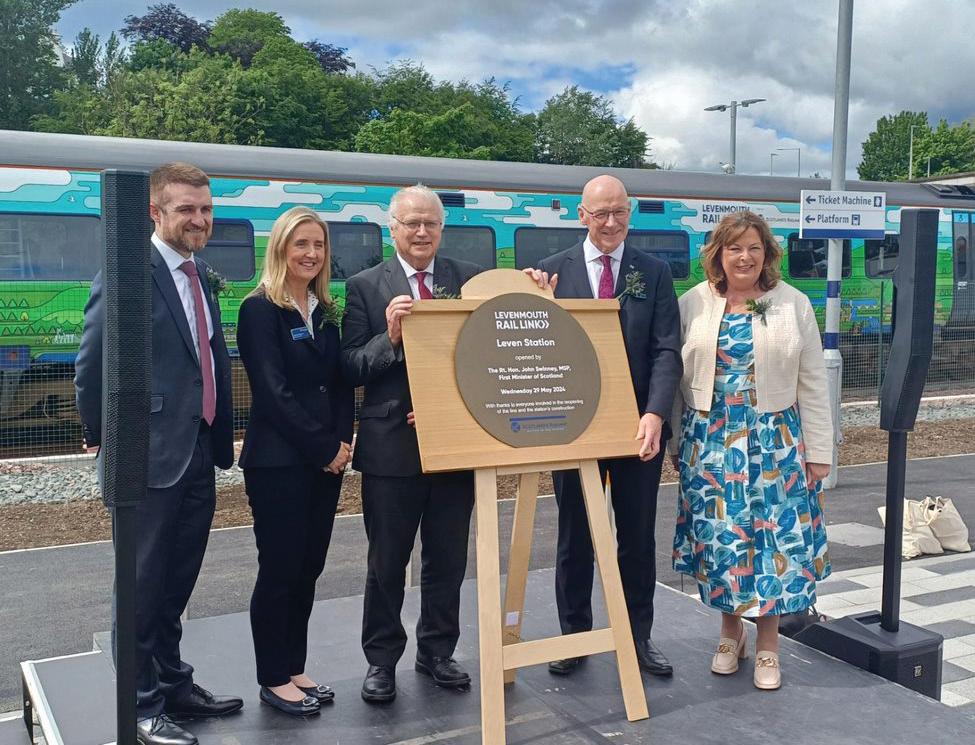
Scotland if Scottish ministers delegate or give away rail franchising functions to the Integrated Rail Board (IRB).
She continued: “That body would not be directly accountable to the Scottish Parliament or the taxpayer. Scottish ministers would have very little control over it and in particular no statutory powers to direct or influence.”
Hyslop argued that Scottish ministers should be granted authority to issue direction or guidance to the IRB regarding activities funded by the Scottish Government.
She continued: “That would provide greater accountability... but also ensure that Scottish ministers were consulted. As you will remember, we anticipated that we would be the primary funder of the IRB in Scotland, so I think that that is a reasonable request.”
OFF-PEAK FARE PILOT EXTENDED
Scotland’s fare pilot will now run until October
FARES
Scottish first minister John Swinney has extended the ScotRail peak fares removal pilot until the end of September 2024. This means that all off-peak fares and products set by ScotRail will be valid for travel throughout the day.
“By extending this pilot for a further three months, we can better understand its impacts,” said Swinney. “It also helps tackle inequalities by making commuting, day trips and access to leisure activities even more affordable.”
IN BRIEF
ETCS MILESTONE
On June 2, a Great Northern Class 717 train made history as the first digitally signalled train to operate on a UK mainline. Running between Welwyn Garden City and Hitchin in Hertfordshire, the train utilised the European Train Control System (ETCS) in test conditions and forms part of the East Coast Digital Programme which will see ETCS rolled out across the East Coast Main Line. Testing will continue until mid-2025, paving the way for passenger and freight operations to commence.
AVANTI’S EVERO DEBUT
The June 2 timetable change marked the introduction of Avanti West Coast’s first Class 805 bi-mode trains on routes from London to the Midlands, Chester, and North Wales. Named Evero, the fleet will eventually include 23 trains: 13 five-carriage bi-mode units (Class 805s) and 10 sevencarriage electric units (Class 807s). The bi-mode trains, capable of switching between electric and diesel power, will primarily serve the London to North Wales route, while the electric trains will operate between London, the West Midlands, and Liverpool.
GWR SUPERFAST RETURN
The new summer railway timetable has seen Great Western Railway reintroduce weekday SuperFast services between London Paddington and South Wales for the first time since March 2020; the doubling of midday capacity from London Paddington and Plymouth; and additional services on the corridor between London Paddington and Bristol Parkway, as well as additional services to summer holiday destinations.
www.passengertransport.co.uk 14 June 2024 | 07
LEVENMOUTH OPENS Scottish first minister John Swinney joined over 300 guests from the local community to open the Levenmouth railway at the end of May. The £100m project links two new stations with the Fife Circle Line.
Begg - Edinburgh must future-proof its buses
Professor David Begg has warned his home city to respond to an increase in bus journey times by extending bus lane hours and vociferous campaigning
BUS PRIORITIES
It’s a warning that could be applied to cities across the United Kingdom, but on this occasion Professor David Begg was talking about his home city of Edinburgh: future-proof your bus network against further increases in journey times or risk decline.
Begg, former chair of the Commission for Integrated Transport, spoke at a meeting of the Edinburgh Bus Users Group in the Scottish capital last week.
While hailing Edinburgh’s transport system as “one of the best in the UK”, the former Edinburgh councillor urged the group to mobilise bus users and hold politicians to account on bus speeds. He also called on the city’s council-owned bus operator, Lothian Buses, to be more forceful in speaking up for bus users.
Begg lamented that statistics on bus journey times are not readily accessible. However, he cited City of Edinburgh Council’s strategic business case for funding from the Scottish Government’s “paused” £500m Bus Partnership Fund, which revealed that “bus journey times in Edinburgh continue to increase as a result of congestion - by nearly 20% in the last 10 years on certain corridors”. Begg pointed out that this decline is despite the roll-out of ‘TapTapCap’ contactless ticketing and capping by Lothian. He said that contactless ticketing had reduced boarding times to just 1.5 seconds per passenger, compared to six seconds per passenger
required to process ‘exact fare’ cash payments.
In June 2016, Begg produced a report for Greener Journeys - The impact of congestion on bus users - which found that bus journey times had been rising by almost 1% per annum on average across the UK’s most congested conurbations. His conclusion was that this trend was largely responsible for the decline in bus use - with the evidence suggesting that “a 10% decrease in speeds reduces patronage by at least 10%”.
At that time, Edinburgh had been one of the few UK cities to buck the trend of falling bus speeds, at least for a decade. Between 1986 and 1996, scheduled bus speeds increased by 5% as a result of better conventional bus priority, culminating in the radical ‘Greenways’ bus priority scheme - which was implemented in 1997 when Begg was chair of the council’s transport committee.
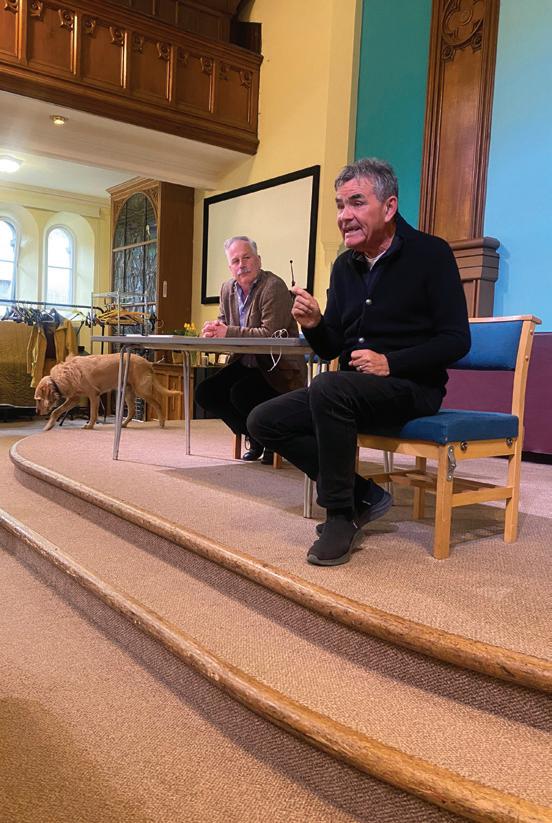
However, this legacy had already begun to dissipate through weaker enforcement of bus lanes and the removal of bus priority during off-peak periods in 2015.
When the Greenways were introduced they operated six days a week between 7am and 7pm. And, thanks to a good working relationship with the police, bus lane offenders were 15 times more likely to be penalised than today.
He asked: “Why have bus journey times deteriorated by 20% in Edinburgh over the last decade? Has it got anything to do with the fact that bus priority has been diluted? ... You’d better believe it is.”
Begg said that the network could be future-proofed against further decline in bus speeds if the Scottish Government resumes the Bus Partnership Fund and supports Edinburgh’s “fantastic” bid for bus priority improvements on eight key transport corridors,
“Why have bus journey times deteriorated by 20% in Edinburgh over the last decade? Has it got anything to do with the fact that bus priority has been diluted?”
which seeks to reduce journey times by 10% and journey time variability by 25%. “You get a cost to benefit ratio of 13 to 1,” he said. “Nothing compares with this. I don’t see any other project that compares with this.”
In the meantime, however, Begg believes that bus campaigners should focus on getting back to having bus lanes operate between 7am and 7pm - seven days a week.
He acknowledged that supporting bus priority measures is not always the politically expedient option (opponents of bus lanes used to call him “Bottleneck Begg”). Urging bus users to become more vocal, he recalled: “I never got anyone coming into my surgery when I was a councillor asking for more bus priority. I got plenty of people coming in complaining about bus priority.” He said: “Politicians now, whoever makes the weather, they will adapt to it ... Try and make that weather and get the politicians to do the right thing.”
Begg would also like to see Lothian Buses apply more pressure. He remarked: “Municipal bus companies are a great thing. Does it help in terms of the local authority giving more bus priority? Probably - but there is a downside. Even though Lothian, I think, is the best bus company in the UK, the downside is they don’t always challenge their shareholder. So when the shareholder, the council, diluted bus priority, they maybe could have been much more upfront.”
Having generated some press interest in buses during his visit to Scotland, Begg was disappointed by Lothian’s response. “It wasn’t as strong as I’d like it to be,” he said. “I’d like a statement from Lothian Buses saying ‘Yes, we need much better bus priority and this is crucial for our bus passengers’.”
NEWS ROUND-UP 08 | 14 June 2024 www.passengertransport.co.uk
David Begg (right) with Edinburgh Bus Users Group chair Harald Tobermann and his dog Buster
“We need to ensure that creating a fairer, more sustainable transport system is top of the agenda for the next government”
CBT sets its manifesto for next government
Rail reforms and a minimum service level for buses are key asks
POLICY
The Campaign for Better Transport has published its general election manifesto, outlining its transport asks for the next government.
The manifesto calls for prioritising investment in public transport, walking, and cycling over road building. It also advocates for replacing short-term competitive funding with long-term, multi-modal funding settlements for all local transport authorities and seeks a commitment to set a target for a shift towards public transport and active travel.
Key demands include simplifying and making rail fares
TRANSDEV URGES ‘RIDE WITH PRIDE’
Double decker makes its debut at York Pride
COMMUNITY
Transdev Blazefield is encouraging its passengers and colleagues to “ride with pride” with the launch of a rainbow-coloured double-decker bus. The vibrant vehicle made its debut last weekend at York Pride, the annual celebration that showcases the city’s support for the LGBTQ+ community.
“The head-turning livery on our brilliant Pride bus has been created in-house by our own amazing designer Ashlie Minasian to promote equality among our customers, colleagues and communities,” said Transdev project and marketing manager Matt Burley.
more affordable through reforms to the fares and ticketing systems. They include freezing rail fares while fuel duty remains frozen and replacing the Retail Price Index with the Consumer Price Index for calculating annual regulated fare increases. CBT has also called for a cap on peak fares at 20% above the off-peak fare, the continuing rollout of single leg and multi-modal ticketing with capped pricing across all city regions, and work towards a national interoperable model.
The manifesto also calls for establishing an arms-length integrated rail body, ambitious targets for electrification, a strategy to match existing trains to electrified routes, and developing an ongoing pipeline of new train orders to provide longterm certainty for the rail sector.
It also highlights the need for progress on essential infrastructure projects such as Northern Powerhouse Rail, East West Rail, and the northern legs of HS2. Additionally, it supports more open access services on viable routes and an International Rail Strategy to ensure the UK is directly connected to more European cities.
For buses, the Campaign for Better Transport calls for new legislation that outlines minimum levels of bus service provision for all communities and makes the provision of socially and economically necessary services a statutory requirement.
It also advocates reallocating a proportion of the road investment budget to buses to ensure local transport authorities have sufficient funding to deliver that
minimum level of service.
Other bus-related asks include:
Extending bus franchising powers to all local authorities;
Establishing a national standard for real-time information at bus stops;
Making bus operators statutory consultees for new housing developments; and
Implementing a nationwide standard scheme of discounted flat fares for children and young people under 22.
“Whatever the result of the forthcoming election, we need to ensure that creating a fairer, more sustainable transport system is top of the agenda for the next government,” said Silviya Barrett, CBT’s director of policy and research.
“Prioritising investment in public transport, shared travel, walking and cycling with a commitment to reduce the number of car journeys should be a priority, for the sake of communities, the economy and the planet.”
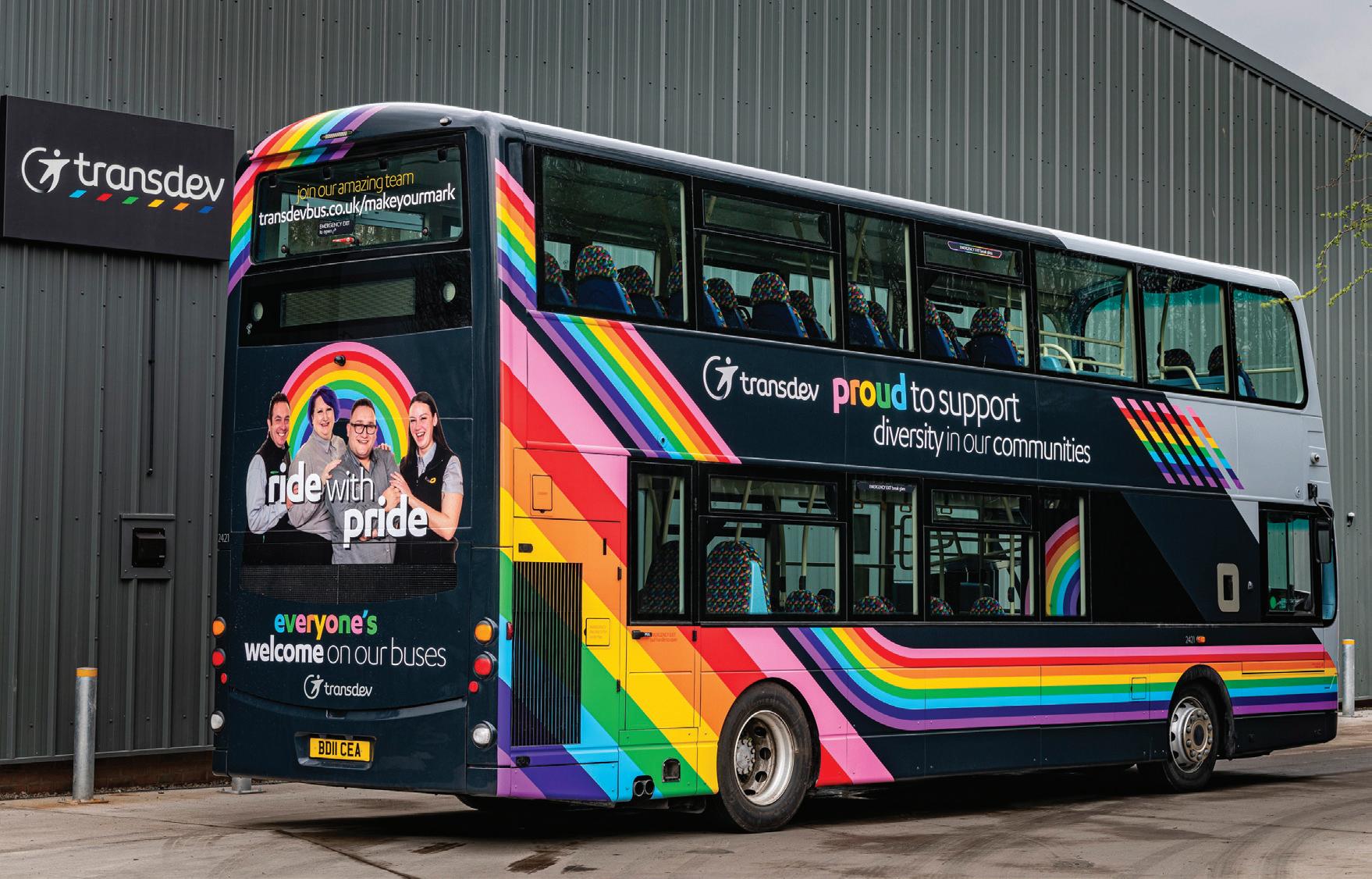
www.passengertransport.co.uk 14 June 2024 | 09
Four of Transdev’s team appear on the back of the Pride bus – training manager Dale French and bus drivers Carly Broadley, Sarah Stevenson and Chris Marsden
Skates - GBR must let Wales decide priorities
Welsh transport secretary’s assertion can be viewed as another shot across Keir Starmer’s bows from Labour leaders who want more devolution
DEVOLUTION
Welsh transport secretary Ken Skates has issued a warning to the next UK government that Great British Railways must allow Wales to make its own decisions on how and where infrastructure funding is spent.
With opinion polls pointing to a Labour victory in the general election, Skates’ assertion can be viewed as another shot across Sir Keir Starmer’s bows from Labour leaders who want more devolution. One of Labour’s elected metro mayors in England has already said that they will act as “a collective voice to counter the Westminster and Whitehall-dominated discussion on the action needed to kick-start our national economy”.
“That would obviously be to the benefit of the Wales and Borders service area”
Ken Skates

rail, bus and coach services. Cardiff Council closed the bus station to make way for property development, and the last remaining services moved to on-street stops in 2015.
INTEGRATION
The new Cardiff Bus Interchange will open on June 30, seven years late and with TrawsCymru services absent. Transport for Wales will open its doors three days early, for the public to learn about the new facilities and the services which will depart from it.
For decades, Cardiff was the envy of Swansea, Newport and many other cities in having a large bus station adjacent to its main railway station, providing easy interchange between
The council said a new bus station would open in 2017. Eventually, the Welsh Government stepped in to deliver a 14-bay bus station with waiting facilities on the ground floor of a new office block. The new station, much smaller than the old, is east of the previous site and equally easy to reach from the railway station.
Most buses will continue to operate from on-street stops. Scheduled coaches will continue departing from Sophia Gardens, outside the city centre.
TfW was brought in to the bus station project at a relatively late
Skates told the Senedd last week: “It’s my firm feel that if Great British Railways were to be taken forward, then we as Welsh ministers, Wales as a nation, would have to be able to determine how and/or where funding for rail investment is carried out, and that would obviously be to the benefit of the Wales and Borders service area that we are responsible for.”
When Tony Blair was prime minister, the Labour administration in Wales was offered control of rail infrastructure. Ministers declined the offer because the Welsh Assembly (before it became the Welsh Parliament/Senedd) was in its infancy and they were concerned about taking on too
stage. It will provide customer ambassadors during the customer familiarisation days.
Cardiff Bus will initially transfer 12 of its routes to serve the interchange from June 30. Stagecoach will operate two services, both to the Rhondda Valley, from the interchange. Other bus services are likely to be moved to the facility later this year.
Long-distance TrawsCymru services T4 and T14 will not use the interchange. They go from Cardiff to Brecon, with the T4 continuing to Newtown and the T14 to Hereford via Hay-on-Wye. Commercially-operated by Stagecoach South Wales, they have been departing from Greyfriars Road, on the opposite side of the city centre from Cardiff Central, since
many responsibilities too quickly. The Core Valley Lines have been devolved to Wales but the other rail infrastructure remains reserved. Welsh ministers are frustrated by the quantum of enhancement funding provided for Wales and the Borders and slow progress on schemes which are central to Welsh transport policy, such as construction of five or six new stations east of Cardiff Central as the main alternative to building the controversial and expensive M4 Relief Road.
Skates told the Senedd last week: “In terms of the four lines to the east of Cardiff Central, I’m afraid no commitment was given to me prior to the general election by UK Government ministers of the need to upgrade the infrastructure and the willingness to do so.”
The UK Government promised enhancements to the main lines in North and South Wales when it announced the cancellation of Cardiff to Swansea electrification in 2017. Seven years later, no funding has been allocated for delivery of any of this work.
pandemic travel restrictions were eased.
The walk from Cardiff Central to Greyfriars Road is so long that Traveline advises passengers travelling to Brecon from stations east of Cardiff to stay on the train to Neath and catch the TrawsCymru T6 to Brecon from outside Neath railway station - a circuitous routeing.
PassengerTransport asked Stagecoach whether it chose to continue operating the TrawsCymru services from Greyfriars Road or had been denied access for them at the interchange. A spokeswoman replied: “We’re working collaboratively with Transport for Wales to prepare for the opening of Cardiff Bus Interchange and will be operating services 122 and 124 from 30 June.”
BUS
Long overdue Cardiff Bus Station opens this month
INTERCHANGE TO OPEN WITHOUT TRAWSCYMRU
10 | 14 June 2024 www.passengertransport.co.uk NEWS ROUND-UP
“Service user numbers have increased, achieving the main goal of these changes”
Patronage increases in first bus reform county
Gwynedd sees benefits of work with TfW to reshape networks
NETWORKS
Bus passenger numbers have started to increase in areas of Gwynedd where the local authority and Transport for Wales have introduced revised networks. However, planned changes in another area of Gwynedd have been abandoned after local opposition.
TfW is working with Welsh councils on reshaping local networks to reflect changes in demand and prepare for franchising. Gwynedd is the first to implement the results. A Cyngor Gwynedd (Gwynedd council) spokesperson told Passenger Transport: “Over recent months, officers from Cyngor Gwynedd’s Integrated Transport
‘BALANCE 20MPH WITH NEW BUS PRIORITY’
‘Potential for
bus priority ... should be looked at’
ROADS
A team which reviewed the implementation of the 20mph default speed limit in Wales has recommended investment in new bus priority to counteract the impact of the lower speed on bus services.
Many bus services, particularly on longer inter-urban routes, saw changes to journey times, routes or frequencies as a consequence of restricted roads becoming 20mph by default last September. Some of
Service have been working with Transport for Wales to review local bus services across the county. This review has been carried out on an area basis and updated services are already running along the Sherpa’r Wyddfa network and in the Dyffryn Nantlle, Caernarfon and Meirionnydd areas.
“Since these changes have been introduced, service user numbers have increased, achieving the main goal of these changes.”
There were complaints in Meirionnydd last winter when imminent new timetables were announced following no public consultation, but some additional services were registered at short notice to fill gaps.
Gwynedd had planned a raft of changes in Dwyfor, for routes west of Porthmadog and Caernarfon, from June 30 but there was opposition from councillors who
the changes were made in advance, others in reaction to the impact of the change on running times and reliability.
The Welsh Government has admitted there were flaws in the way the new speed limit was implemented, and last autumn it commissioned a review of the policy and the guidance which local authorities use to decide whether a road should be exempted to remain at 30mph. It expects some roads to revert to 30mph in late summer or early autumn, following a “listening exercise”.
The final report of the team says authorities face a trade-off between benefits and disbenefits. In some cases, reverting to 30mph could be justified if accompanied
feared a worsening of services and were concerned at a lack of consultation. The council has invited bids, by June 24, for the current services to continue for two years. The public will be informed of any changes once the tendering process is complete.
Gwynedd and other North Wales authorities have been much slower than the rest of Wales to re-tender services for the Bus Network Grant, which replaced the Welsh Government’s emergency funding for the pre-2020 network on April 1. They are continuing to fund the pre-April services until the end of this month. There were many changes of operator in South and West Wales, but the emerging picture in North Wales is of little or no change.
Gwynedd Council will introduce two more G-prefixed
by infrastructure investment, such as segregated provision and new crossings for pedestrians and cyclists.
“Where most criteria would support the retention of the default 20mph speed limit, but there is evidence of bus routes being adversely affected and added journey time leading to cuts to services or cuts to areas served to catch up on time, then the potential for bus priority measures should be looked at along the bus route,” says the report.
In the years before the change in speed limit, PassengerTransport reported on bus industry concerns that the government could be underestimating the impact the 20mph default limit would have on
services arising from its network review on June 30. The new G8 and G9 services will operate in the Bangor area under contract to Arriva, replacing Arriva’s 67 and 78 services. The G8 from Bethesda will be hourly, halving the current frequency on the 67 but extending beyond Bangor bus station to a large supermarket.
In Denbighshire, the X51 from Ruthin to Wrexham will revert to serving Llandegla village and will omit Southsea and New Broughton, in Wrexham. Its removal from the village as a result of last year’s new 20mph speed limits was used as ammunition by critics of Wales’ 20mph default speed limit.
Arriva will increase service frequency to every 15 minutes between Connah’s Quay and Chester and operate additional morning services between Wrexham and Chester. Arriva’s main Anglesey route will have a route variant removed, to provide a more consistent hourly service between Bangor, Llangefni and Holyhead.
bus services. CPT Cymru called for “ambitious bus priority measures” alongside the change in speed limit in June 2022, more than a year before the change was implemented. Statistics released last week show a 32% decline in road accident casualties on Welsh 20mph and 30mph roads in the last quarter of 2023 compared with the same quarter in 2022. However, there is no evaluation yet of the impact on passenger numbers of slower bus journey times. Some inter-urban routes, passing through successive built-up areas, have become significantly slower while the same journeys by car are mostly on bypasses and other roads unaffected by the 20mph default limit.
www.passengertransport.co.uk 14 June 2024 | 11

Council for Net Zero Transport formed
Experts will support the next government as it refocuses on the challenge of delivering net zero transport while maximising the benefits to the UK
ADVICE
Zemo Partnership has announced the full membership of the new independent Council for Net Zero Transport chaired by Lord Deben, former chair of the Climate Change Committee. With the general election imminent, Zemo claims that the Council for Net Zero Transport is well placed to support the new government as it refocuses on the challenge of delivering net zero and maximising the benefits to the UK from the transition.
Chair of the Council, Lord Deben said: “The recent High Court decision that the Carbon Budget Delivery Plan was unlawful underlines the scale of the challenge that will be facing the next government. Progress on net zero has stalled. In some areas we’ve gone backwards.
“Transport is one of the most challenging and complex sectors of the UK economy to decarbonise. It is also responsible for around a quarter of the country’s greenhouse gas emissions.
“This new council brings together very experienced people in key positions and with the widest range of perspectives to help us forge an evidence-based, multi-stakeholder consensus on how we can maximise the benefits from this essential - and inevitable - transition.”
Zemo’s executive director, Claire Haigh, said: “Whoever enters Downing Street on 5th July the fundamental challenges for net zero remain the same.
Our dependence on fossil fuels exacerbates the threat of climate change and exposes us to ever increasing risks.
“Transport is the fastest growing source of global greenhouse gas emissions. We urgently need to move beyond targets to the delivery of net zero transport. There are huge benefits and industrial opportunities if we get this right. We need a clear roadmap to the destination.
“We’re greatly encouraged that so many leading people with large stakes in the transport decarbonisation agenda have readily agreed to work with
us to steer UK transport decarbonisation through this next crucial delivery phase.”
Zemo Partnership (formerly Low Carbon Vehicle Partnership/ LowCVP) is a uniquely broad stakeholder partnership. A notfor-profit organisation, it has been working for over two decades to provide unbiased guidance to government and industry around the policy and initiatives needed to accelerate road transport decarbonisation.
The partnership will be working closely with more than 200 member organisations to develop an overall delivery roadmap for
“There are huge benefits and industrial opportunities if we get this right. We need a clear roadmap to the destination” Claire Haigh, Zemo Partnership
CONFIRMED MEMBERS INCLUDE:
The Rt Hon Lord Deben (Chair)
Professor Jillian Anable, Chair in Transport and Energy, University of Leeds, Institute for Transport Studies
Elizabeth de Jong, CEO, Fuels Industry UK
Mike Hawes, CEO, Society of Motor Manufacturers and Traders
Fiona Howarth, CEO, Octopus Electric Vehicles
Professor Neville Jackson, Chair, RAC Foundation
Edmund King, President, Automobile Association
Cordi O’Hara, President, UK Electricity Distribution National Grid
Dr Doug Parr, Chief Scientist & Policy Director, Greenpeace UK
Anne Shaw, Executive Director, Transport for the West Midlands
Chris Stark, CEO, Carbon Trust
Martin Tugwell, CEO, Transport for the North
David Wells, CEO, Logistics UK
TBC - Chair, Local Infrastructure and Net Zero (LINZ) Board, Local Government Association
net zero transport - supported by underlying sectoral roadmaps - showing the best routes to decarbonised UK transport. The Council for Net Zero Transport will provide strategic oversight and help to steer the direction.
There will be a report on progress at a series of quarterly briefings, the next one scheduled for September 3. Zemo will be holding a broader ‘summit’ on October 3 to engage the Partnership’s members and other key stakeholders to inform the sectoral roadmaps.
The ultimate objective is to provide the next UK Government with a coherent, consensus-based plan to guide future policy as well as to provide a clearer basis for policy decisions taken at all tiers of government.
Anne Shaw, CEO, Transport for the West Midlands and a member of the Council for Net Zero said: “There is no lack of ambition among the transport sector to move towards a greener futureindeed in the West Midlands we are taking great strides towards our target of a net-zero carbon region within two decades.
“Our Local Transport Plan is based on the principle of decarbonising our transport and encouraging people to shift from private car journeys to public transport or active travel. We have hundreds of electric buses, more miles of tram lines, bus lanes and cycle routes delivered or under development.
“But we know this may not be enough and we will need Government to get behind us, that is why we joining the Council for Net Zero Transport, pooling our expertise to overcome shared challenges and advise Government so action can be targeted to where it will make the most difference and help us transition towards a net-zero future.”
www.passengertransport.co.uk 14 June 2024 | 13
NET ZERO
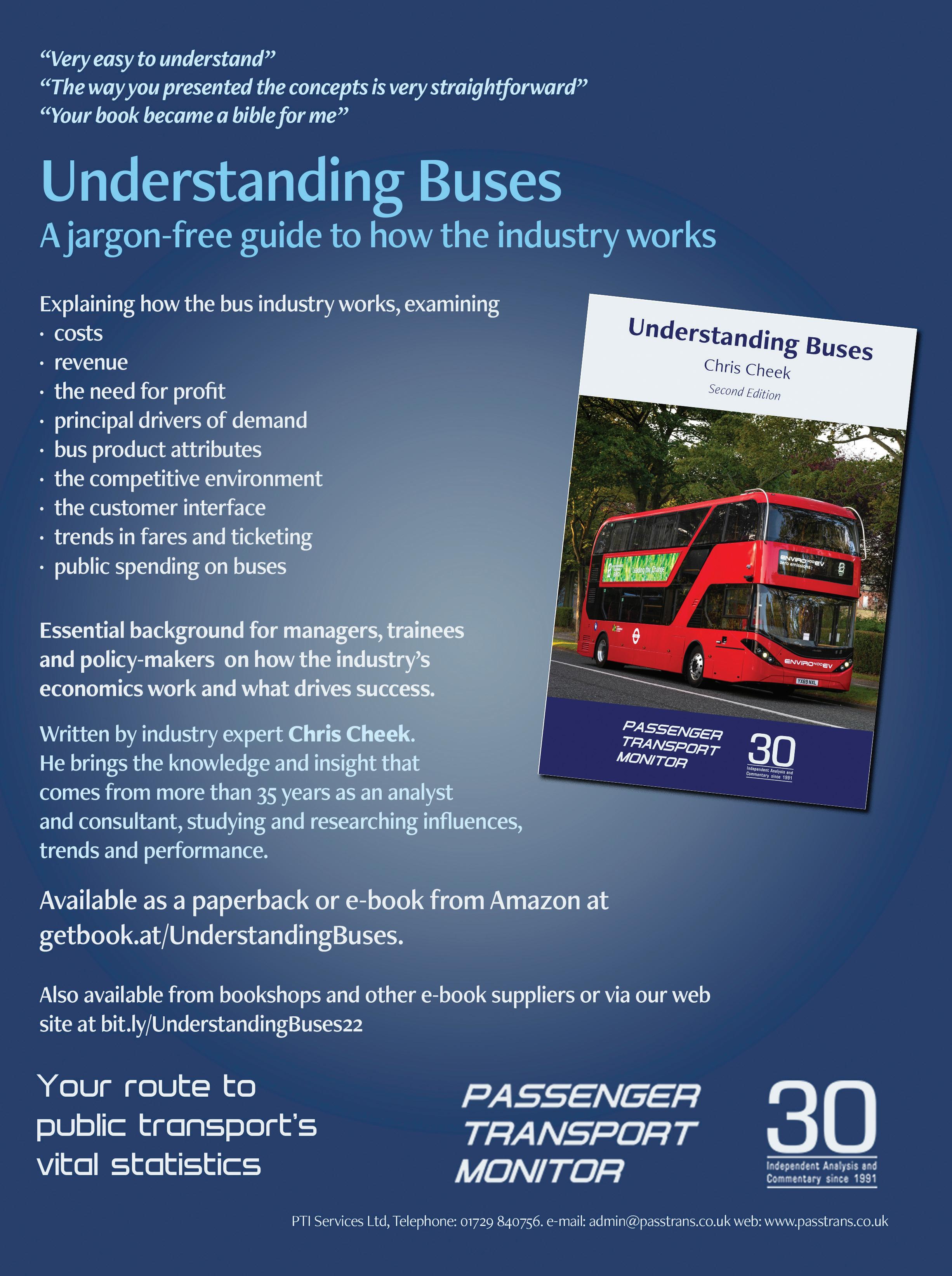
INNOVATION & TECHNOLOGY
NXWM tickets now sold on Citymapper
Integration offers all-in-one plan, pay and ride experience
APPS
Citymapper this week announced the launch of its firstever mobile ticketing integration, making National Express West Midlands (NXWM) bus ticket purchases available within the Citymapper app, through an integration with Masabi.
This first-of-its-kind integration gives passengers an all-in-one plan, pay and ride experience, allowing NXWM passengers to use the Citymapper app to plan their trips and purchase tickets for travel on NXWM buses.
NXWM provides on average 210 million bus passenger journeys per year across the West Midlands. The bus operator has partnered with Citymapper and its established user base of over 50 million global users to meaningfully improve public transport access for users travelling throughout the region.
NXWM says that this collaboration is a key component of its plan to provide more integrated and environmentally friendly mobility options to riders. By giving instant mobile ticket access to passengers who have the Citymapper app on their phones, choosing to travel by bus is even easier and more convenient.
The mobile ticketing functionality within the Citymapper app has been made possible using Masabi’s Software Development Kit (SDK). The SDK creates a seamless and secure mobile ticketing purchase and payment experience. Ticket types
available via the Citymapper app include single, day, and weekly bus tickets, which customers then validate as they board the bus and scan their ticket using NXWM’s onboard validators.
Citymapper (which was acquired in 2023 by Via, the global leader in TransitTech), provides travellers with easy, personalised journey-planning across all transport modes available in their cities. This latest integration combines the ticket-purchasing and the journey-planning experiences. Passengers are prompted to purchase tickets at intuitive moments during the planning process, making it easier to travel on public transport.
It’s not the first time that National Express West Midlands has worked with tech partners to provide convenient transport ticketing options. In April, the
company announced another first-of-its-kind partnership with the launch of its bus tickets within the Uber app (PT311). This functionality was also made possible by Masabi’s Justride Software Development Kit.
Antony Goozee, bus strategy and commercial director for National Express, commented: “As the landscape of public transport continues to evolve, it’s important that we provide customers with a convenient bus journey planning and ticketing experience.
“We are thrilled to announce our partnership with Citymapper, and by integrating our bus services and tickets with their user-friendly app we are providing new and existing passengers with seamless access to greener, easier transport options.
“This first-of-its-kind collaboration represents a
“It’s important that we provide customers with a convenient bus journey planning and ticketing experience”
Antony Goozee, National Express
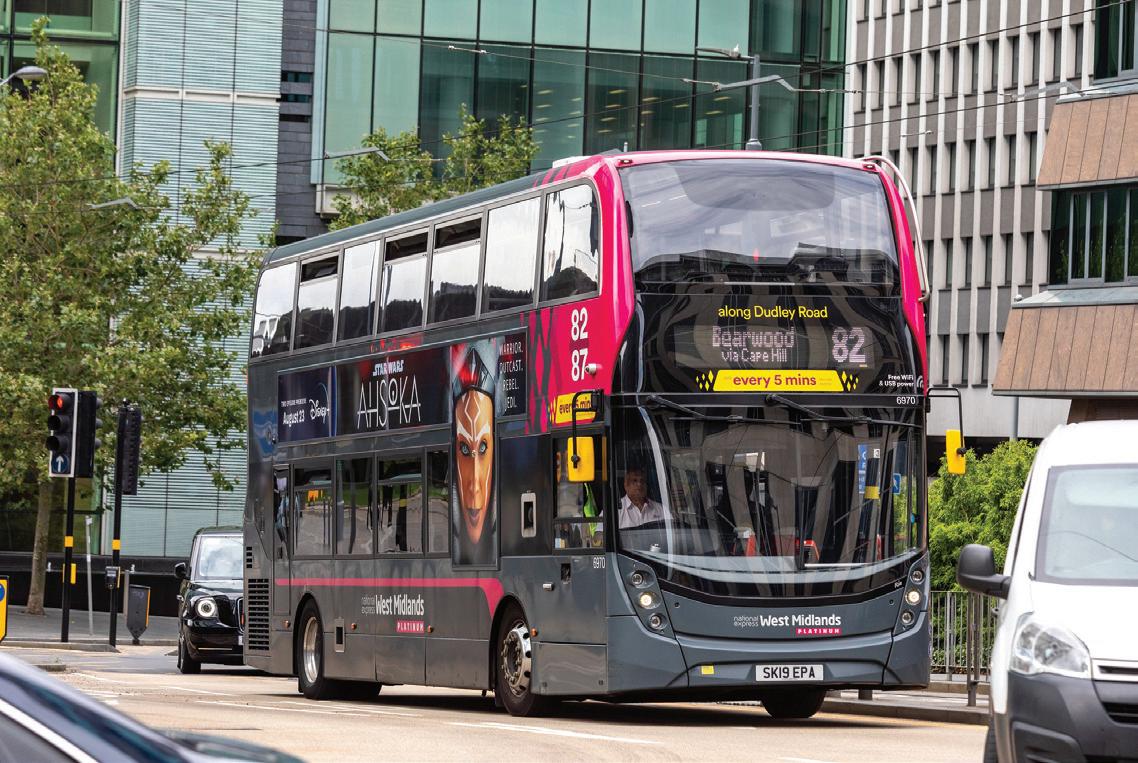
significant milestone in our mission to make it more convenient to move around the West Midlands by bus.”
Nithya Sowrirajan, chief product officer at Via, said: “Via believes in a world where everyone has access to efficient, affordable mobility. This partnership between Citymapper, Masabi, and National Express West Midlands moves us all closer to that vision by making it easier for more riders to discover, plan and pay for public transport. This in turn will empower more riders to use public transport more often.
“We’re thrilled to debut this offering in the West Midlands and look forward to working with other leading agencies and authorities to offer this seamless experience in their own communities.”
This week’s announcement marks another milestone in the long-standing partnership between NXWM and Masabi. In 2016, Masabi and NXWM forged a successful partnership, introducing the mTicket app. Building on this success, in 2018, Masabi and NXWM unveiled a smart ticketing scheme tailored specifically for students, followed in 2021 by a successful cash digitisation programme for ticket purchases at retail locations.
In 2023 alone, over 43 million bus trips were made easier and more efficient thanks to mTickets and this next innovation will help more people use their phones to travel across the West Midlands
Brian Zanghi, CEO of Masabi, said: “We are excited to further develop our partnerships with National Express West Midlands and Citymapper to help deliver a better passenger experience for travellers across the West Midlands and we expect other cities will look to offer their passengers this functionality.”
www.passengertransport.co.uk 14 June 2024 | 15
Collaboration makes bus travel easier and more convenient
INSIDE TRACK MARKET MONITOR
NTS reveals big shifts in bus trip-making
Analysis of the latest National Travel Survey shows there has been a huge reduction in trip rates amongst women and older people since Covid
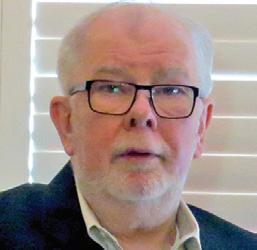
The Department for Transport (DfT) has published new data from its National Travel Survey, combining data from the last six months of the 2022 survey with the first six of 2023. The limited number of tables predates publication of the full 2023 data later in the year.
The figures point to a continuing recovery from the Covid-19 pandemic, with overall trip rates increasing between the 2022 survey and these interim results. The public as a whole made an
estimated 882 trips per person per year (tpppy) by all modes in 2022/23, up by 3.4% compared with 2022. However, the figure remained 8.2% below the 952.6 trips recorded in the 2019 survey. Shopping trips, for long the backbone of travel demand, also increased, up 2.7% to 165.4 tpppy, compared with 2022’s figure of 151.1. Again, however, this was substantially down on pre-pandemic levels, when 180.6 tpppy were recorded. That’s a shortfall of 15.4%.
Looking specifically at the bus market in England outside London, the overall trip rate crept up by one per cent, with a rate of
23.5 tpppy compared with 23.2 in 2022. The last pre-Covid figure recorded in 2019 was 31.6, leaving a shortfall of 25.8%.
Analysis of responses on people’s reasons for making their journey shows trip rates for commuting, business and education and leisure all fell slightly between 2022 and the latest data, whilst those for shopping, escorting and personal business showed an increase. When comparing the 2022/23 trip rates with those of 2019, we see a sharp fall in all categories, ranging from 21% for commuting to 55% for business travel (albeit on a very low base - even in 2019, the rate was only 0.483 tpppy - see
BUS TRIP RATES BY AGE AND GENDER IN 2022/23 (TRIPS PER PERSON PER YEAR)
Source: National Travel Survey, Department for Transport
Figure 1).
Translating those trip rates into estimated passenger numbers, we see from Figure 2 that there is now a roughly even split in percentage terms between commuting/ business (22.5%), shopping (23.3%), education 23.3%) and leisure (20.7%) than in previous years. In the days before online retail took off, shopping tended to predominate, accounting for over 30% of trips in the first decade of the century.
There have been some major shifts in the demographic profile of bus users, according to the survey, with trip rates falling across the generations, but particularly amongst older people (see table). The overall small recovery in 2022/23 was not universal: there were continuing falls in trip rates amongst those between 17 and 20, and people in their forties and fifties. The highest year-on-year growth came from those over 70, showing an increase of 14.6%.
Comparing trip rates with the
ALL PEOPLE All ages < 17 17-20 21-29 30-39 40-49 50-59 60-69 70+ 2010 42.2 44.2 87.4 43.4 27.5 26.5 27.9 53.7 60.4 2019 31.6 36.5 73.3 33.0 19.9 18.5 20.9 30.7 46.4 2023 23.5 24.9 64.9 27.7 20.6 15.9 12.9 17.9 30.4 % change since 2010 (44.3%) (43.6%) (25.8%) (36.2%) (25.2%) (39.9%) (53.7%) (66.7%) (49.6%) % change since 2019 (25.8%) (31.8%) (11.5%) (16.0%) 3.5% (14.0%) (38.2%) (41.9%) (34.4%) MALES All ages < 17 17-20 21-29 30-39 40-49 50-59 60-69 70+ 2010 36.2 44.2 72.3 39.0 23.0 19.0 23.9 43.9 47.6 2019 27.0 36.1 68.9 34.0 13.1 9.8 16.9 21.8 39.3 2023 21.0 23.8 65.1 21.5 14.9 17.5 10.9 14.8 27.2 % change since 2010 (42.0%) (46.3%) (10.0%) (44.9%) (35.3%) (8.3%) (54.3%) (66.2%) (42.9%) % change since 2019 (22.3%) (34.1%) (5.5%) (36.7%) 14.1% 78.9% (35.1%) (31.8%) (30.8%) FEMALES All ages < 17 17-20 21-29 30-39 40-49 50-59 60-69 70+ 2010 48.0 57.9 126.7 53.4 34.5 39.5 39.4 65.4 75.5 2019 36.1 44.1 102.9 47.9 31.9 33.8 31.8 63.0 70.2 2023 25.9 26.1 64.7 33.6 25.9 14.4 14.8 20.8 33.2 % change since 2010 (46.1%) (54.9%) (48.9%) (37.0%) (24.9%) (63.5%) (62.3%) (68.2%) (56.0%) % change since 2019 (28.4%) (40.8%) (37.1%) (29.8%) (19.0%) (57.3%) (53.3%) (67.0%) (52.7%)
Chris Cheek Analyst
16 | 14 June 2024 www.passengertransport.co.uk
“Changes in demand for bus travel induced by the pandemic have settled into a pattern”
last pre-pandemic year, one agegroup, between 30 and 39, actually shows an improvement of 3.5%, but the others show sharp falls: this is as high as 42% amongst people in their sixties, and 34% amongst the over seventies. Young people under 17 show a 32% decline.
There are some significant differences in behaviour between men and women, with the latter showing much more significant falls in bus use since 2019 across all age groups, with the gap widening with age, so women in their sixties are making two-thirds fewer trips since the pandemic. Even so, women continue to have higher trip rates than men across all age groups save one, the twentysomethings.
Comment
This latest update to the National Travel Survey offers further confirmation, if it were needed, that the changes in demand for bus travel induced by the pandemic have settled into a pattern rather than a position from which recovery can be expected. Demand for bus services generally is rising again, but only slowly. Figures from the DfT show that in the first three months of this year, demand averaged just over 90% of prepandemic levels outside the capital and just below 90% in London. This compared with 88.9% and 88.4% respectively during 2023.
The NTS update goes a long way to explaining the shortfall, mapping both the changes in journey purpose and in the age and gender of bus users. The loss of shopping trips is particularly significant, accounting for some 466 million trips a year compared with 2010, almost half of the one billion passenger journeys lost over the years since. This has been much more damaging than the change in leisure trips (162 million trips, or 16% of the loss) or
commuting patterns (103 million trips, 10% of the loss).
The huge falls in trip rates by women across the board are striking, especially amongst the four age-groups above 40. This may be linked to the fall in shopping trips, but the suspicion must be that the fear of travel induced by the Covid-19 virus and government anti-travel campaigns of the time has remained lodged in people’s psyche. Of course, it won’t have helped that consumer spending remains below preCovid levels and that the overall economic performance since the pandemic has hardly been stellar. As so often in the past, then, the bus industry has had to withstand a storm whipped up by factors
outside its control. It is emerging now, still afloat but rather damaged. There are still many uncertainties about the future, but at least this sort of analysis enables greater understanding of where we’re at and helps identify some target markets for the future. Meanwhile, we are promised another tech revolution over the next five or ten years with the spread of artificial intelligence into all aspects of our lives. It’s already clear that this will have profound and unknowable impacts on the way we live and the way we travel. Flexibility and speed of response will be essential. Let’s hope that the new regulatory system that is emerging can deliver these.
FIGURE 1: CHANGES IN TRIP RATES BY JOURNEY PURPOSE
Source: National Travel Survey, Department for Transport
ABOUT THE NATIONAL TRAVEL SURVEY
The National Travel Survey (NTS) is a household survey of personal travel, from data collected via interviews and a seven-day travel diary, which enables analysis of patterns and trends. The statistics for the year ending June 2023 include data from the second half of 2022 and the first half of 2023. In the year ending June 2023, the survey captured responses from 10,351 individuals covering 167,916 trips. The National Travel Survey mid-year estimates are available at: https://www.gov. uk/government/statistics/ national-travel-survey-mid-yearestimates-year-ending-june-2023
Source: National Travel Survey, Department for Transport
6.4 5.1 7.1 0.5 0.2 0.5 7.2 5.5 7.7 7.4 5.5 13.3 0.8 0.6 1.2 2.9 1.8 4.2 6.4 4.9 8.2 Trips per person per year in England (outside London)
FIGURE 2: SHIFTS IN THE MARKET SHARE OF BUS TRIPS BY JOURNEY PURPOSE
Commuting Business Education Shopping Other escort Personal business Leisure Proportion of total bus trips 2010 2019 2023 Commuting Business Education Shopping Other escort Personal business Leisure 2010 2019 2023 20.2% 21.5% 16.8% 1.5% 0.9% 1.1% 22.7% 23.3% 18.4% 23.5% 23.3% 31.6% 2.6% 2.5% 2.8% 9.1% 7.8% 10.0% 20.3% 20.7% 19.4% www.passengertransport.co.uk 14 June 2024 | 17
COMMENT
ALEX WARNER

The good, the less good and the ugly
It’s that time of year, six months in, for my customary half-term report on how the public transport sector has been performing
Franchising provides a bit more clarity
Keeping it affordable and simple
Let’s be honest, if we cannot get folk to travel by bus when the fares are only £2 then we might as well give up. Thankfully, it’s been a success and there are reports of all seats being taken on many buses and I have seen from my extensive travels greater demand and spoken to many a converted customer. On longer distance routes, growth has been up to 20%. I kid you not you will absolutely not find a better bargain anywhere in modern society than a trip on Transdev Blazefield’s Coastliner service all the way from Leeds to Scarborough or Whitby for only £2!
Reducing the fares has obviously been great, but in equal measure, the simplicity of a flat £2 fare on pretty well every bus route in England is as big a benefit as the low price. If and when the fares cap comes to an end, please can we keep it at a flat price anywhere? By all means offer multi-operator rovers (such as the Great Scenic Journeys ‘Scenic Explorer’ in North Yorkshire, which goes ‘live’ any day now and is jaw-droppingly amazing value), but please can we keep the core fare a ‘one size fits all’ product. Customer habits have changed, they love the simplicity of tapping on with their contactless card or easily finding £2 in cash, knowing what they are paying. It’s been game changing.
A few years ago, I was genuinely worried about bus franchising. I thought it would be boring and I feared that brown-suited civil servants would be entrusted with developing the customer and marketing proposition and those whizz commercial gurus in the bus sector would leave in their droves. I got it wrong, and I can see the benefits of a more prescriptive, simple and consistent customer service proposition on a regional basis. I have seen the local authorities engaging with the industry to gain their views and recruiting bus experts to inject their commercial acumen and expertise. Whatever your perspective on bus franchising, at least there is greater certainty around the future strategy. We have a strong grasp of where it is going to happen and broadly when and how. The rail sector, mired in interminable uncertainty, can only look on enviously at its colleagues in the bus industry. How times have changed.
Women in Bus and Coach has impact
The emergence of the Women in Bus and Coach organisation has been impactful and the appointment of experienced transport professional Louise Cheeseman, has been a masterstroke and is already helping steer the industry collectively on the path towards making lasting change. I just wish that we could make a breakthrough in terms of attracting, from an ethnicity perspective, under-represented groups on board buses.
Many bus companies do not resonate at all with those living in the streets in which their buses travel every few minutes. It’s a complex subject and requires a multi-faceted approach, but one which the industry must address. If we do, it will be truly wonderful.
Pristine railway stations at last I think I’d be quite bored managing stations these days. Two decades or so ago, when I was in my pomp and prime, I used to enjoy presiding over swathes of stations and loved visiting them with my notebook, nit-picking about out-of-date notices, grumbling about broken poster frames, unkempt floral displays, broken benches, smashed windows and stained floors. My attention to detail was unbridled and I regularly gave the ‘hairdryer’ treatment to my errant station teams for their negligence. Some people would say it was a power kick on my part, but, in truth, it was vitally important for us to be all over the detail - railway stations showcase the brand and customer proposition.
These days, on my travels, I’m hard pushed to find such aberrations - it’s as if train companies and Network Rail have tried and tested processes to identify and deal with issues in a timely manner and stations are more compact and confined, with superfluous areas and buildings (those places that used to be a magnet for poorly presented décor and facilities) having been reduced. Local managers don’t appear to take it upon themselves to design and display ham-fisted notices and everything is corporate and on-message. It’s all a bit boring really. The only thing I have to criticise now on stations is the Hornby model railway display in the LNER waiting lounge at King’s Cross which looks great (but not as good as the one in my attic of course), but the train never moves. It really infuriates me.
Delightful drivers
85% of customers in the Transport Focus ‘Your Bus Journey’ 2023 survey were either satisfied or very satisfied with bus drivers. That’s not a bad score, on a par, if not slightly higher than the various results over the years on equivalent surveys for rail staff and, dare I say it, the lot of a bus driver is more pressurised than of those working on railway stations (cue: furore from train company folk). The pressures of stopping and starting
THE GOOD... 18 | 14 June 2024 www.passengertransport.co.uk
“If we cannot get folk to travel by bus when the fares are only £2 then we might as well give up”
the bus with such frequency, keeping to time, dealing with errant motorists and negligent pedestrians as well as discourteous customers (and there are quite a few on some routes) as well as monitoring what’s going on downstairs and upstairs, including anti-social behaviour - it’s the hardest of jobs. And all this before having to be an encyclopaedia in terms of answering questions about fares and onward travel. I wouldn’t last five minutes, not forgetting of course, I don’t even have a car driver’s licence.
I’m struggling to recall the last occasion when I came across a rude driver. I genuinely cannot. I also get the impression from drivers that I talk to that they are finding one bit of pressure if taken off them, by the uniformity of the fares - £2 every time and customers’ satisfaction with this deal as well, which brings me back to my previous point. I’ve been mystery shopping buses for over 13 years now and there has been a massive step-change in the attitude and friendliness of bus drivers. I also see it on the many customer service training courses that I run for them too - a more engaged and highly contributing cadre of delegates, you’d be hard pushed to find.
Invasion of the body snatchers
The self-congratulatory curse on social media continues but is now more geared towards individuals fawning over an employer instead of themselves. Progress at least.
Corporate cloning has led to gut-wrenching, cult-like eulogies with occasional jibes that life is so much better in these organisations than in days gone by under previous regimes. There’s not a hint of self-doubt that customer service and performance in general is just so utterly brilliant, even if like all transport companies there are ups and downs. It’s not just on socials that this is present but also in conversations with those in some organisations. Don’t get me wrong, it’s great that folk are giving the impression of blissful contentment and that they’ve found the solution to all the challenges facing public transport, but at times and in some places, it’s like watching a modern-day version of the classic film ‘Invasion of the body snatchers’ in terms of brainwashing.
Performance is rail’s Holy Grail
Punctuality and reliability are the bedrock of customer satisfaction yet still remain the nemesis of the rail industry. Granted, Network Rail’s performance is of critical importance, but just when one train company fixes its issues, another comes along with a whole new set of problems. In a bygone previous era, a train company would be grappling with all sorts of diverse tasks and challenges that would constitute excuses for poor operational performance. Distracted by franchise bidding, transitioning to a new franchise, rolling out a whizz marketing campaign or a swanky fleet or a new brand to get bums on seats, maybe increased dwell times at stations due to record numbers of customers travelling - there used to be so many variables at play and competing demands on the time and expertise of train companies. Now, they don’t really have any of these factors as excuses.
Open access opportunists
In a throwback to a more entrepreneurial era, it’s been exciting and entertaining to see the flurry of open access applications recently. Compelling though this is, I wonder if it goes against the laudable efforts to create a simplified railway for customers. Will the ORR, in assessing applications, look beyond the availability of train paths, to determine whether the sum of all these proposals, is commensurate with a better all-round experience across the UK and supports the overall strategy for rail?
I am writing this article on a Northern train from Hull to Doncaster and a young lady is trying to fathom out why she cannot use her Hull Trains only, Hull to London ticket on this section of the journey. She didn’t know there were separate train companies, and the patient and friendly Northern conductor has sat next to her to very politely explain that what she is doing is like going into Aldi with a Lidl gift voucher and expecting to use it. He’s let her off, but she’s still on the phone to Trainline trying to determine why she ended up buying this ticket. If we created the railway with a blank sheet of paper, I’m not sure we’d do it this way.
“I’m struggling to recall the last occasion when I came across a rude driver”
...AND THE UGLY
Anti-social antics on the rise
Criminal activity and anti-social behaviour on public transport is on the rise, mirroring societal problems. What surprises me, though, is the lack of trend analysis on a pan-operator and regional basis. It’s as if the industry thinks that hoodlums, thugs and organised crooks are discerning when it comes to choosing where to cause havoc in the same geographical area. Maybe, they do - perhaps they will target a train if it has driver-only operation. It would be good to know and certainly help in terms of future thinking around staffing models. What’s clear though, is that there seems an increasing proliferation of imbeciles playing films and music or having conversations on their phones on speaker. It’s doing my head in. Why do I want to listen to their gangster rap or movie? This nonsense must cease.
Cheesed off with cheese and onion
Every half-term report I bemoan the state of on-board catering. It’s so utterly pathetic now and has sunk to embarrassing levels. Even the provision of First Class freebies are unpredictable and certainly so at weekends, whilst in Standard Class, you’ll be genuinely hard pushed to find a savoury snack. LNER, which traditionally has been one of the best around when it comes to inspiration and on-board service provision seems to have caught the curse. Last Friday, on a trip from Doncaster to London, all that was available was a cheese and onion sandwich. This isn’t rare either (nor a shortcoming exclusive to LNER) and is why I now stock up at King’s Cross before my trips north. Is it time for the rail industry to stop dabbling with catering, accept it’s never going to work and give up?
ABOUT THE AUTHOR
Alex Warner has over 30 years’ experience in the transport sector, having held senior roles on a multi-modal basis across the sector. He is co-founder of transport technology business Lost Group and transport consultancy AJW Experience Group (which includes Great Scenic Journeys). He is also chair of West Midlands Grand Rail Collaboration.
...THE LESS GOOD...
www.passengertransport.co.uk 14 June 2024 | 19
COMMENT
NICK RICHARDSON

Do we need to go back to basics?
Attracting new users to trains and buses sometimes requires an explanation of the basics and how to use and access the service
New marketing initiatives are being aimed at people who are unfamiliar with using trains and buses, going back to the basics of what to do in advance, on the journey and getting off. This seems rudimentary to anyone who deals with passenger transport but to a generation defined by car-dependency, it presents a helpful introduction for the uninitiated. Doing so falls into the same bracket as advising people how to walk or how to eat properly, a sad reflection on today’s society. At one time people walked everywhere as a matter of course and didn’t worry about the weather or if they would be assaulted along the way. Using passenger transport was also a habit and regular users had some idea of what to expect and how to behave.
Anyone who provides transport services needs to understand that there are people well into middle age who have no relationship with trains or buses because they have driven or been driven everywhere. Their entire travel experience involves cars and the associated joys of private space, car parks and freedom about when and where to go; this partly accounts for their resistance to anything that might impinge on that behaviour. Hence there is a need to educate the populace about how passenger journeys work and how to use them.
Demystifying trains
Great Western Railway, along with many other train operators, has a programme called ‘Try a Train’ to make the railway ‘accessible
to everyone’. Making potential customers confident about train use is a good ambition with the potential to create regular users for decades to come. This starts with the basics on the assumption that even if people have seen trains, they might have absolutely no idea how to use them. Anyone tempted to try one for the first time will most likely be baffled by the vast array of information available, even if they know where to start, not helped by a plethora of train operators and even less logical times and fares supplied though a multitude of providers and media. This first toe in the water is a huge step into the unknown and anything that demystifies the experience should be welcomed. Try a Train applies to specific groups though rather than the general population and includes people with disabilities or accessibility needs, schools and groups including those with Special Educational Needs and specialist academies, job or education seekers, the elderly and children. This covers quite a chunk of the market, but it may be difficult, for example, to convince job seekers to rely on trains or more probably to pay a high fare to use them. ‘The elderly’ covers a range of people, some of whom will be perfectly capable of travelling
independently but might need help with negotiating the various means of finding out train times and purchasing tickets.
Try a Train is presented in two parts, at a station (safety, planning, ticket purchase, where to stand on the platform and so on) and onboard trains (getting on and off, help available, etc.), both supported by GWR staff and, significantly, volunteers from both the rail industry and local organisations. This all sounds really helpful, but identifying the potential participants may require some effort because many represent groups that are already open to the possibility of using trains.
The other qualifier is that GWR’s initiative is only available at GWR stations and trains, so perhaps explaining how the railway isn’t well integrated might be pertinent. It’s desperately complicated and probably makes no sense to many would-be users, particularly if they aspire to travel beyond GWR territory. There is no rational explanation regarding how you can buy your ticket from GWR, any other train operator and a number of other outlets besides and how they all offer different prices and conditions. From my local station for example, there are two types of fare to a particular major destination provided by three operators, but one of the ticket options is slightly cheaper if you only use the green trains rather than the darker green or grey ones (which may be blue anyway). Try explaining that to the uninitiated. Nonetheless, GWR’s offer appears to be a good step in building communities that understand, use and like trains and TOCs who provide ‘Try a Train’ schemes should be commended for their initiative.
Explaining bus use
Meanwhile, First Bus has been thinking about how to explain how to plan a journey, get on, pay for a journey and get off a bus. It is shamelessly back to basics which is no bad thing and is clearly aimed at younger people. The programme is called ‘Know How’ and allegedly responds to First’s customer information revealing that some customers need ‘a bit of help to understand to use the bus’.
“There are people well into middle age who have no relationship with trains or buses because they have driven or been driven everywhere”
20 | 14 June 2024 www.passengertransport.co.uk
Tel: 01536 740100

@ciltuk
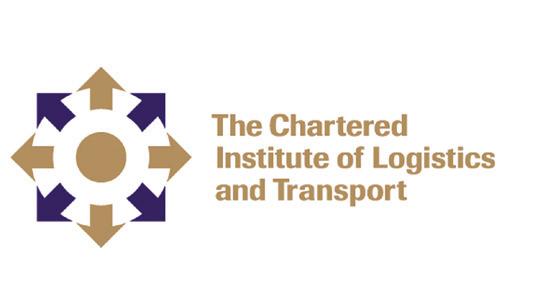
‘Try a Train’ programmes support individuals and groups in developing their travelling confidence
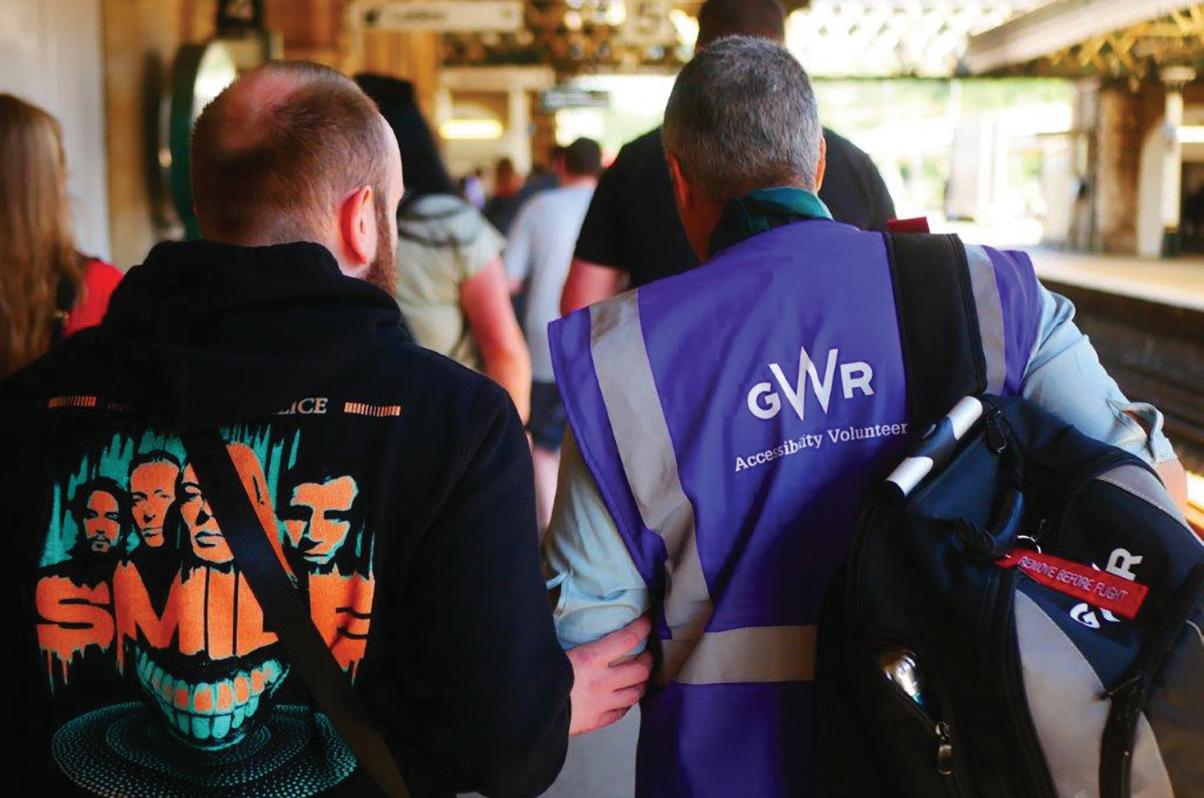
So far so good but the resources are also aimed at the wider market who may not relate in any positive way to bus services in general or First in particular. The materials form a series of thirty-second YouTube videos on planning a journey, finding lost property, tracking the bus, stopping the bus, payment and getting off the bus. All are helpful snippets to explore although anyone aged under 50 will probably not understand them at all - for example, describing how a passenger indicates that they want to get off: ‘right show us this bus stuff, oh you’re going to like this - whoa whoa - what is that just, you wait watch this, the time has come to push the button’.
This might be intelligible for some sections of the market (clearly not all) but it’s a first step at appealing to users without being overly dull. Perhaps First can come up with both content and media that would appeal to others e.g. older users or anyone with a neurological condition to make them feel confident, welcome and safe.
Know How is a painless means to find out more but taking a step further back is really important, that is the point where anyone will think about bus as an option; this is the tricky part. How can bus services become part of the popular psyche? As with the ‘Try a Train’ initiative, it needs to be remembered that the offer is a bus journey, a subset of which is a journey with First. Hence the planning a journey component could be accompanied by information about how to get to the bus stop and what to expect when you get there. A lot depends on downloading the First Bus app which may be a tentative first step towards bus use but getting to that point may be the bigger challenge. Regarding payment, there is no mention of cash, just contactless card, mobile phone and First Bus app. It will be interesting to assess the reaction to the initiative by how many times the videos are viewed and ultimately how many more journeys are made and hopefully First will be following up to identify the effects. Finding out about new
users in more detail would be really helpful such as their other travel options and why they have decided to try the bus; they may not have easy car access and could be tempted by the £2 fare cap but finding out requires more intensive analysis.
Despite both Try a Train and Know How being offered by FirstGroup, neither makes the connection between buses and trains, possibly to keep messaging simple or because integration between the two is generally poor. Both initiatives are positive steps in covering the basics and indicate strong potential for broadening the concept. I look forward to more of these initiatives across the country.
ABOUT THE AUTHOR
Nick Richardson is chair of CILT’s Bus and Coach Policy Group and is a former chair of the Transport Planning Society. In addition, he has held a PCV licence for over 36 years.
IN ASSOCIATION WITH:
www.ciltuk.org.uk
www.passengertransport.co.uk 14 June 2024 | 21
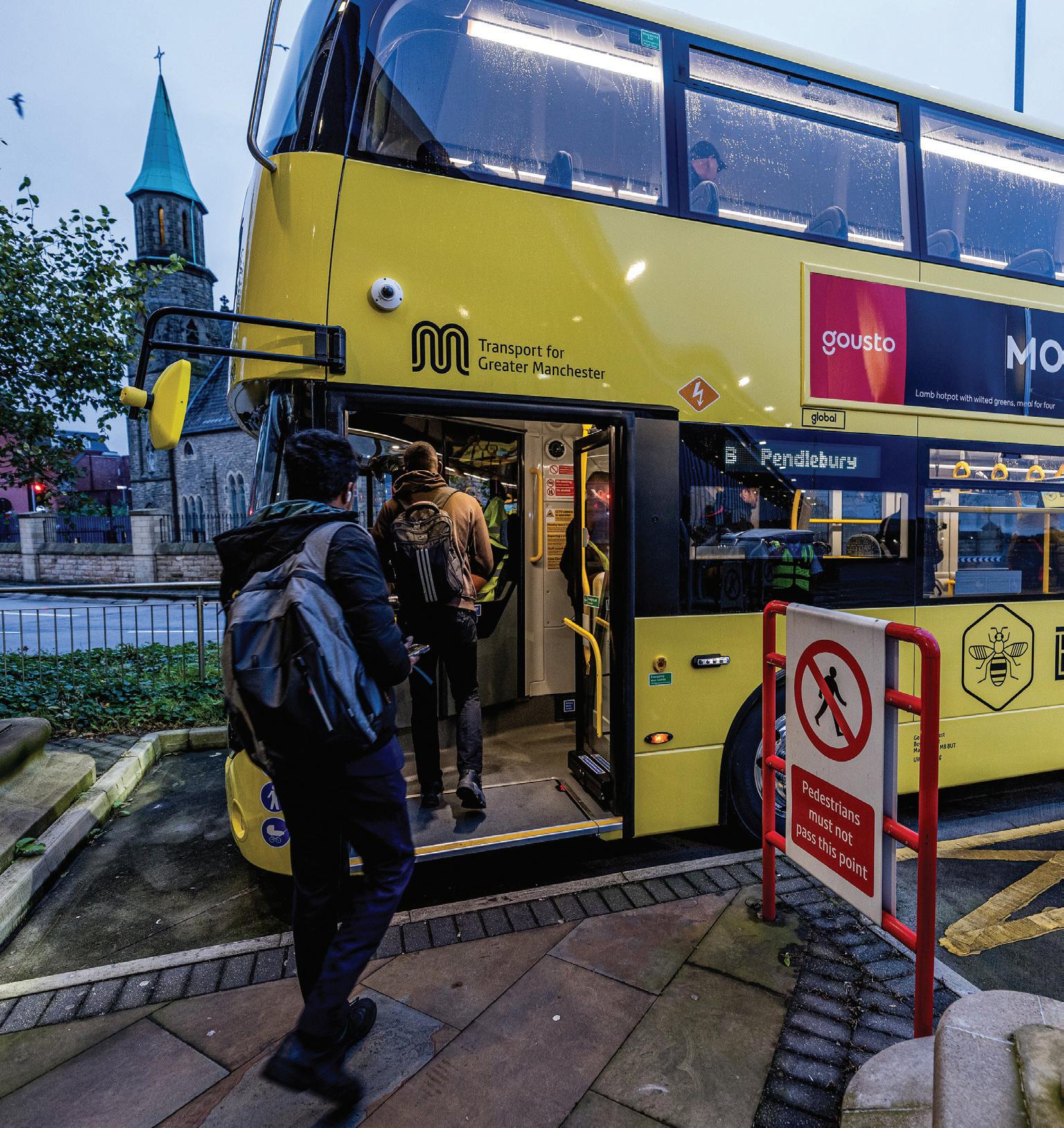
Bus franchising: one
size does not fit all
Richard Jeremy and Maqbool Alibhai explain how the future of the UK’s buses will be built on a variety of approaches
In the recent Westminster Hall debate on transport in the West Midlands, shadow public health minister Preet Kaur Gill made a passionate intervention on the subject of buses that will have raised a cheer from many: “Buses are the lifeblood of the community,” she said. “They are indispensable for connecting people to jobs, opportunities, education, public services, and friends and family.”
All of that is undeniable, as is the fact that buses have been the poor relation of public transport policy for decades: generally
neglected, often misunderstood and always underfunded. However, recent legislation that permits greater local authority control over bus services backed by new money to support rural areas, means that situation is changing fast: buses are getting their moment in the policy limelight at last. Greater Manchester has led the way, taking the region’s bus services back into public control in a London-style franchise system, a centralised, publiclyowned body that contracts specific services to private operators through competition for the
contracts rather than on-the-road competition for a local market. There’s a buzz in the bus world right now. So much so, in fact, that in some spheres franchising has come to be seen as a panacea for all the UK’s bus-related woes. But can it really be the whole answer?
Franchising
Critics have often contrasted the decline and incoherence in bus provision that can be seen in much of the country with the strength of the London network which was kept in public control using a franchise system. Under this critique, the centralised Transport for London model allows for network-based route planning, integrated fare structures, co-ordinated bus priority and coordination with other transport modes, including measures to disincentivise driving, while elsewhere there has been a free-for-all of private competition which led to less profitable routes falling into decline while thousands of people were driven off the buses altogether by the combined frustrations of poor timetabling, operator withdrawals, opaque pricing and uncoordinated ticketing. They attribute the current state of the UK’s bus networks to the related policies of privatisation and deregulation.
All of this is fair enough as far as it goes, although maybe a little rose-tinted: many UK bus services were in consistent decline before these changes were introduced. In fact it was the widespread shift towards car use which ultimately undermined the bus market in the UK: muddled government policies encouraged road building in the 1960s whilst at the same time the Transport Act (1968) introduced the concept of Passenger Transport Executives and legislation in support of public sector subsidy for bus and rail.
It is undeniable that London is a powerful example of successful franchising, and maybe it’s still too early to call Greater Manchester successful, but the signs are good. The simple fact is that not everywhere is a large city like London or indeed Greater Manchester with huge demand that can run complex services with minimal central government support. Smaller towns and cities, or rural regions without dense urban populations may find they need to consider alternative forms of franchising and bus regulation compared to the ‘London model’, even if this is the approach they wish to pursue.
There’s a buzz in the bus world about Greater Manchester’s Bee Network
SYSTRA’s
22 | 14 June 2024 www.passengertransport.co.uk COMMENT
Taking control of service provision via franchising or a municipal model (as available in Scotland) includes taking on at least some administrative costs and a burden of risk currently borne entirely by the private sector under the commercial delivery models. Outside London, buses across the UK, excluding Northern Ireland, have been operating a commercial model since the 1980s, so it means that skills and expectations in the wider operator, local authority and consultancy sectors will face some steep learning if a switch to a franchise model of network planning and operation is rolled out entirely.
Municipal operations
The ideal of a rich eco-system of small and medium-sized private operators of highquality, competing for franchised routes, is frankly unrealistic in many areas of the country (just as on-the-road competition has proved illusory since bus deregulation in 1986), and not borne out by experience to date in Greater Manchester. There will likely be costly tendering processes that run the risk of the same few big operators dominating the market through their economies of scale and global tendering experience.
Some local politicians may wish to respond by going the whole hog and running the entire local public bus service in-house or via an arms-length company with full ownership of the routes, buses, and staff. This was once the norm in many towns and cities across the UK, but now only a dwindling number of municipal bus operators exist (Reading, Nottingham, Blackpool, Warrington, Ipswich, Cardiff, Newport and Edinburgh, which all operate on an arms-length basis in the commercial marketplace) alongside the publicly-owned Translink in Northern Ireland, and some limited in-house direct operations focused on subsidised bus services. No current local authority has the legal right to start a new municipal bus operation in England or Wales, although it is legal in Scotland. Should legislation change in the future, local authorities will require guidance, not only for setting up operations but on the financial risks in doing so, including operating costs and staff pensions. There are great examples throughout the UK, including Pembrokeshire County Council, which recently took over a local operator to run a rural in-house municipal service.
“Whatever the approach, the focus must be on improving services and making them more responsive to broader policy agendas”
Enhanced partnership
A more practical solution for the smaller cities and less populous rural regions may be an intermediate step in the form of extensive enhanced partnership with private operators. Transport for Cornwall are showing what can be done to take back public control short of full franchising, while operating in a challenging rural environment.
The Cornish authorities obtained the power to take the region’s buses back into public control - something that undoubtedly concentrated the minds of the local bus operators - but did not put it into full effect. Instead, the local authority and the private operators found a way to work closely and cooperatively in partnership to create a service that has many of the benefits of the franchise approach - a locally branded, integrated service with co-ordinated fare structure and so on - while leveraging the commercial knowledge and skills of the private operators that work within that brand, setting high quality standards and avoiding the inevitable costs of having to create an entirely new body. The results have been eye-catching with usage already reaching something close to pre-Covid levels.
So, it doesn’t have to be Manchester-style franchising but, one way or the other, it is clear that greater public intervention in delivery of bus services can go a long way to repairing the rickety condition of many of the UK’s networks. Whatever the approach, the focus must be on improving services and making them more responsive to broader policy agendas such as economic growth, tackling inequality, and delivering carbon net-zero: it is much easier for local authorities to apply and enforce standards for emissions, accessibility, comfort and inclusion when they are franchising the services or operating a much more extensive enhanced partnership.
We have to be realistic about the gains from franchising outside of a wider integrated transport strategy: bus use began to rise in London during the mid-1990s as the bus
priority network gained pace, integrated ticketing bedded down, traffic congestion drove people out of cars and the London Underground network operated at full capacity. Less tangible benefits such as local identity and pride should not be neglected either, the popularity of the red buses in London has to do with more than just their well-integrated routing and fare structure; they are an emblem of the city, recognisable all over the world.
And factors such as community engagement should not be taken for granted. The City of Brighton & Hove is served entirely by private sector bus operators on a largely commercial basis and has the largest number of bus trips per head of its population outside of London. It has a large, influential bus users’ group which works closely with the council to keep the operators in check and shape successful commercial bus routes.
Franchising is a powerful approach that can show excellent results, but one size does not fit all. The future of the UK’s buses will be built on a variety of approaches tailored to local needs that finds a balance between the virtues of the public and the private sectors according to the local conditions. Flexibility has always been one of the great advantages of transport by bus - they don’t have to follow the rails - even if that quality has often been underappreciated and underexploited. Buses really can be the lifeblood of our local communities, and it will be by taking a flexible, locally-responsive approach to bus services, that we get that community heartbeat going once again.
ABOUT THE AUTHORS
Richard Jeremy worked in the Transport for London (TfL) bus network development team and strategy development team from 2003-2013. Richard is a Principal Consultant in SYSTRA’s Bus Operations Team. Maq Alibhai worked as a Bus Operations Director for a variety of bus operating companies in the UK and overseas for 30 years. Maq is an Associate in SYSTRA’s Bus Operations Team.
www.passengertransport.co.uk 14 June 2024 | 23
OIL MARKET REPORT £
PORTLAND FUEL ANALYTICS - JUNE 2024
Guyana’s Black Gold drives rapid growth
South American state’s offshore Stabroek oilfield is valued at $1trn at today’s prices, providing new revenues and thousands of

The South American continent has long been associated with oil exploration. Although not quite as synonymous as the countries of the Middle East, the likes of Venezuela, Brazil and Colombia have a history of supplying the world’s oil needs. The second world war in particular saw the Latin American oil industry become an enthusiastic supplier to the Western powers, such that by 1945, Venezuela had become the world’s third largest oil producer (after USA and Russia).
Tiny Guyana, on South America’s North East coast, played no part in any of these developments. With no oil and gas industry and a population of just 800,000 (less than Glasgow), this sleepy part of the continent was a long way from the hustle and bustle of global energy markets. But all this was to change in 2015, when ExxonMobil struck Black Gold in the Atlantic Ocean, 120 miles off the Guyanese coast. The Stabroek field stretched over an area of 27,000 square kilometres and initially was thought to hold two billion barrels of crude. Furthermore, the oil discovered was of the highest quality (“light & sweet”), meaning it would fetch the highest prices at refineries. In one stroke, the fortunes of this English speaking, cricket-mad corner of South America had been transformed. Today, Stabroek is estimated to hold over 11 billion barrels and by the 2030s, it is estimated
that Guyana will become the fourth largest offshore oil producer in the world. The commercial riches of the field are clearly vast. At today’s oil price, the oil field has a value of around $1trn and with current production levels of 500,000 barrels per day (bpd), it is already generating around $16bn of revenue per annum. Unlike most newly discovered “mega-fields” Stabroek is not state-owned (mainly because Guyana never had a stateowned oil company) and instead is an operating tri-venture between Exxon Mobil (45%), Amerada Hess (30%) and China’s National Offshore Oil Corporation (25%). With little experience in negotiating oil concessions, Guyana’s Department of Energy nonetheless played a canny hand in its dealings with these giant multinationals, insisting that once capital costs have been recovered (over several years), 50% of oil revenues would go into the country’s newly created National Resource Fund (NRF).
This fund is already sitting on a $2.4bn pot and in the first quarter of 2024 alone, the NRF was topped up to the tune of $600m in royalty payments (roughly the same amount that the country spends annually on public healthcare). With oil revenues now responsible for 30% of Guyana’s national spending programme, public
“The Guyanese people are unsurprisingly excited about their future”
finances are undergoing seismic changes, whilst the country overall is experiencing astonishing growth. Traditional unemployment levels in Guyana have been in excess of 15%, the average salary is circa $400 per month and 48% of the population subsists on less than $5 per day. But last year, GDP growth was 38% and the year before (2022), it was a staggering 62%. The IMF is now forecasting that Guyana will be the fastest growing economy in the world for the next five years! In terms of jobs, 8,000 nationals are already directly working for the oil and gas industry and a further 25,000 are indirectly employed by the associated supply chain and service industries. Forecasts vary wildly as to how many more jobs will be generated as the oil fields develop, but they will be significant.
The Guyanese people are unsurprisingly excited about their future, but it goes without saying that all kinds of pitfalls lie ahead. Oil prices rise, but almost always spectacularly fall at some point. Demand ebbs and flows with the tide of global consumption and the steady electrification of transport may mean there is less need (or price incentive) to bring the full 11 billion barrels out of the ground. Guyana could also be struck by the “resource curse” that has blighted so many Petrostates, where overreliance on oil production becomes damaging. Such economies grow to be hugely imbalanced, as the oil industry hinders the development of other sectors. And when oil prices rise, Petrostate governments are famous for “splashing the cash” and thus stoking inflation, before finding themselves hugely in debt when prices fall. Often, these countries don’t see their national wealth increase at all and instead end up suffering perpetual economic crises and are left more politically unstable.
The exemplar par excellence of all this is neighbouring Venezuela - once the world’s third largest oil producer (and still the holder of the largest oil reserves), but now confined to producing 500,000 bpd for the likes of North Korea and Cuba, via decrepit facilities. They are watching the developments in Guyana with envious eyes and have recently renewed their claim on the vast Essequibo region, whose waters conveniently include over half of the new Stabroek Oil Field! They have even hinted at potential military action to reclaim the land, which is as predictable as it is depressing. Where there is oil it seems, there will always be geo-political strife.
James Spencer Portland
WANT TO KNOW MORE? Visit Portland’s fuel forum page: portland-analytics.co.uk/fuel-forum 24 | 14 June 2024 Brought to you by PassengerTransport
COMMENT
GREAT MINSTER GRUMBLES

Transport is the dog that hasn’t barked
Our Whitehall insider imagines what’s going on inside the minds of the mandarins at Great Minster House, home of the DfT
Three weeks into the general election campaign not a word has been said by any party about what their transport policies are, let alone what their public transport policies might be. That’s no surprise because transport never features in general election campaigns. And, to be fair to Labour, it has already set out its policies for rail and bus so I’m really not sure that the party has much more it can helpfully say in this regard.
Actually, it’s not entirely true that transport hasn’t featured in the campaign - as I write, the Conservatives have confirmed that they will scrap the Ultra Low Emission Zone for outer London if re-elected. But that’s hardly news as the Conservative London mayoral candidate, Susan Hall, promised to do that anyway. Perhaps what is a touch surprising is that no party, especially Labour, has said anything about HS2. In the last edition of Passenger Transport both Norman Baker and Chris Cheek made some very salient points about the challenges Labour will face in delivering its public transport commitments. Chris Cheek rightly pointed out that, when it comes to bus reform, all that Louise Haigh has committed to is a Bill “in the first term of a new Labour government”. Not, you will note, in the first session of a new parliament. So we may not see any legislation on buses until, perhaps, 2026 or even 2027 which will leave any local authority keen to take advantage of the new liberalised approach to
introducing franchising - whatever that might look like - precious little time to do so before the next general election.
And Norman Baker hit the nail on the head when he observed that a Labour government will get in a mess over the West Coast Main Line, where Virgin has submitted an open access application. Remember, Labour has said it will continue with the open access regime. The irony of a Labour government committed to renationalisation of the railways allowing new private sector open access operations, especially one from Virgin, is too delicious for words. And, of course, decisions on whether to approve or reject an open access application lie with the Office of Rail and Road, the independent regulator. Will a Labour secretary of state for transport be tempted to make it clear to the ORR that, despite its public position on the issue, he or she would really rather not see any open access applications granted - especially from Richard Branson? Or will the “independent” regulator defend its independence to the hilt?
Wherever you look you can see real tensions and problems for a Labour secretary of state delivering on Labour’s public transport promises. When the travelling public see
that train performance hasn’t improvedbecause it won’t, as performance has nothing to do with ownership and control - and that Great British Railways and the newly publicly-owned rail franchises continue to cancel trains and continue to oversee engineering overruns, I wonder what the public will think then of Labour’s rail policies. And I can’t wait to see how Labour’s relationship with the metro mayors plays out. My suspicion is that it will break down pretty quickly when the metro mayors are let down by the Labour government - on two counts. First, because no additional money will be provided to help the mayors deliver the improvements in public transport that they all want; and second, because the legislation to reform bus franchising may be delayed longer than they would wish.
It’s interesting, isn’t it, that there seems to be a broad consensus that a Labour government is going to struggle to deliver its public transport commitments, at least in any meaningful way that the travelling public will notice. In reality, Labour’s public transport polices are little different from the Conservatives’ policies, and that’s because Labour is failing to address a very fundamental point. It’s looking at ownership issues, which is of precious little interest to the travelling public or the electorate, but it’s not looking at deeper issues as to how we pay for our transport networks and the cost of travelling. In my last column I questioned whether a Labour government would be willing to embrace road pricing. I’m not holding my breath. But unless and until any government is willing to embrace this, we will never see the kind of fundamental shift in transport policy that is needed if we are really to make public transport a much more attractive travel option of choice over the car. Sadly, such is the general public’s love affair with the car, and such is the poor quality of public transport in many parts of the country, I’m struggling to see when any government of any colour will be brave enough to grasp the road pricing nettle.
“I can’t wait to see how Labour’s relationship with the metro mayors plays out. My suspicion is that it will break down pretty quickly”
COMMENT
www.passengertransport.co.uk 14 June 2024 | 25
Women in Bus and Coach awards launched
New scheme aims to place a spotlight on women in sector
Women in Bus and Coach will host its first awards ceremony during its annual summit in Manchester on October 9. Sponsored by Transport UK London Bus, the event will recognise the contributions and achievements of women in the bus, coach, and community transport industry.
Louise Cheeseman, chair of Women in Bus and Coach, highlighted the event’s significance. “These awards not only recognise individual achievements but also highlight the importance of diversity and inclusion within the transport sector,” she said.
The organisation’s director, Kerri Cheek added: “This awards ceremony is a significant step towards acknowledging and
AWARDS SEE THE BEST IN EUROPE
Nominations open for Talent in Mobility Awards
Entries are being sought for the European Talent in Mobility Awards which will be held at the European Mobility Expo in Strasbourg on October 1-3, 2024. They aim to recognise individuals contributing to public transport and sustainable mobility across Europe.
Nominations are now open for five categories, aiming to honour professionals at different career stages. The categories are: Best Young Talent: This award recognises a young professional
celebrating the vital contributions that women make every day.”
The awards are open to individuals at any stage of their career who have excelled in their roles and inspired success in others. The categories for the 2024 awards are:
Best Woman in Bus Award (sponsored by Backhouse Jones);
Best Woman in Coach Award (sponsored by IntSol Recruitment);
Best Woman in Community Transport Award;
The Peter, Lord Hendy of Richmond Hill Allyship Award (sponsored by the Go-Ahead Group); and
Woman of the Year Award (sponsored by MCV UK) Judging will occur in July and August. As part of the selection process, shortlisted candidates will participate in an online discussion with the judges. To enter, nominees should email a description (up to 500 words) detailing how they meet the criteria for the relevant award category. Self-nomination is also allowed. Please include the name of the award category in the subject line, and contact details should be provided. Entries should be sent by email to hello@womeninbusandcoach. org.uk by 6pm on July 12.
“This awards ceremony is a significant step towards acknowledging and celebrating the vital contributions that women make every day”Kerri Cheek
(under 30) in the sustainable mobility sector who has demonstrated creativity, proactivity, teamwork, and enthusiasm; Best Project Manager: This award honours a project manager or department head who has excelled in project creation, design, and completion. The recipient will have demonstrated leadership, project management, motivation, and team leadership skills; Best Manager: This award is for a manager or policymaker who has shown exceptional managerial qualities in coordinating stakeholders, conducting innovative projects, and committing to mobility; Special Career Service Award:
This award goes to an individual recognised nationally or across Europe for significant contributions to public transport over their career. The recipient will have made a positive impact through innovation, practical achievements, or other notable successes in sustainable mobility; and Internet Users Award: This award is decided by an online vote at eumo-expo.com. Professionals vote for shortlisted candidates in each category based on career achievements. The winner is the candidate with the most votes. Entries close on July 21. More details can be found online at eumo-expo.com.
APPOINTMENTS

EAST WEST RAIL
East West Rail has announced the appointment of David Hughes as chief executive. He succeeds Beth West in the role.
Hughes (pictured) joins from ARUP where he was major programmes director. He has a long track record in developing and delivering the biggest transport programmes in the UK, with a career that includes serving as director general responsible for rail infrastructure at the Department for Transport, programme director at Transport for the North, and investment planning director at Transport for London.

STAGECOACH WEST
Stagecoach has announced the appointment of Chris Hanson as managing director of Stagecoach West, its Gloucester-based bus operation that covers Oxfordshire and the West of England.
Hanson (pictured), who was previously operations director at the company, succeeds Rachel Geliamassi in the role following her departure to Great Western Railway as customer services director earlier this year (PT305). Elisabeth Tasker has been covering the role on an interim basis (PT306).
He joined Stagecoach from First Bus in 2023, having begun his journey as a bus driver before holding several senior leadership roles across the company. Since joining the operator, Hanson has introduced a new training structure and strengthened the operations team to provide a more reliable service to passengers.
CAREERS 26 | 14 June 2024 www.passengertransport.co.uk

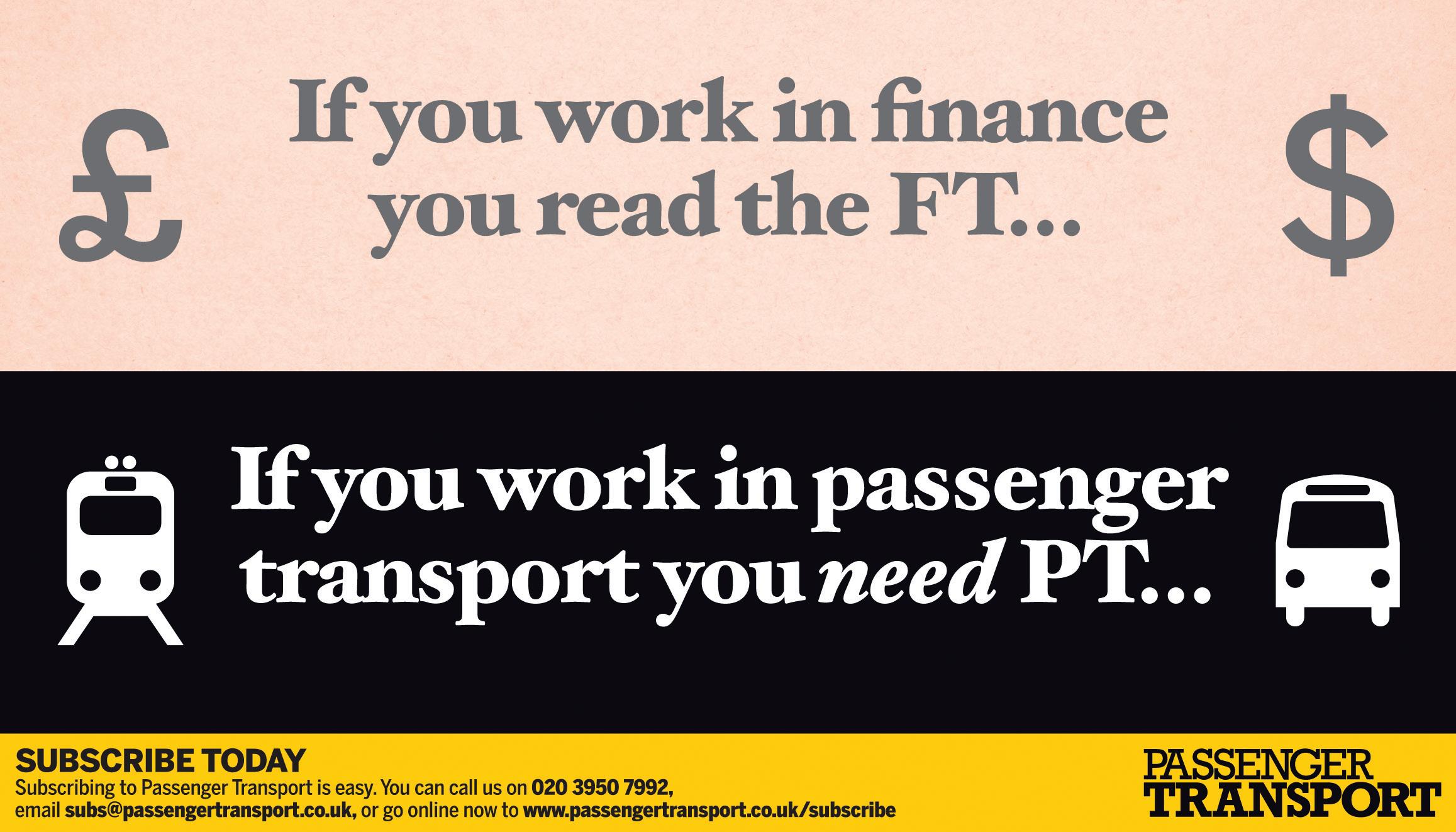
CALL NOW TO ADVERTISE 020 3950 8000 or email sales@passengertransport.co.uk www.passengertransport.co.uk 14 June 2024 | 27
DIVERSIONS
Oxford’s welcome for OxTrail’s Mini Ox Roxy
Bovine VIP visits HQ ahead of OxTrail launch Is this Cow-ley?
Oxford Bus Company recently welcomed a special guest to its Cowley depot ahead of the launch of one of the city’s most recognisable charity events for Sobell House Hospice.
Roxy, a mini version of the oxen set to appear at OxTrail 2024, got a sneak peek around the headquarters before engaging thousands of tourists when the trail launches next month. The sculpture had an ox-traordinary week of work

The Cat is purrfect
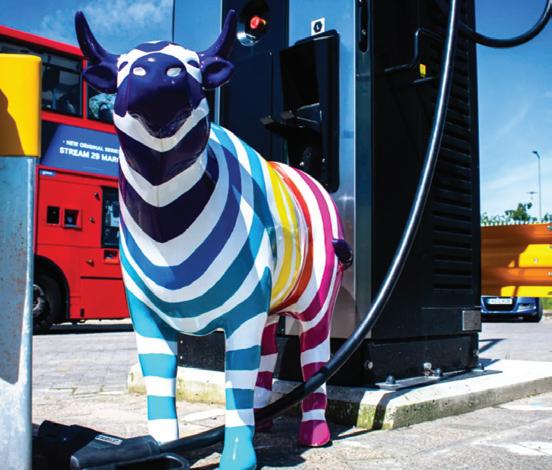
experience, lending a helping hoof by charging the company’s new electric buses, getting behind the wheel, and supporting the maintenance team to keep Oxfordshire’s roads moo-ving.
Roxy’s visit was part of Oxford Bus
Company’s support for OxTrail, a free event featuring life-sized and mini-ox sculptures, each uniquely designed by talented artists.
After the eight-week citywide trail, each sculpture will be auctioned, with all proceeds supporting Sobell House, a charity dedicated to providing specialist palliative care and support to adult patients and their families, friends, and carers.
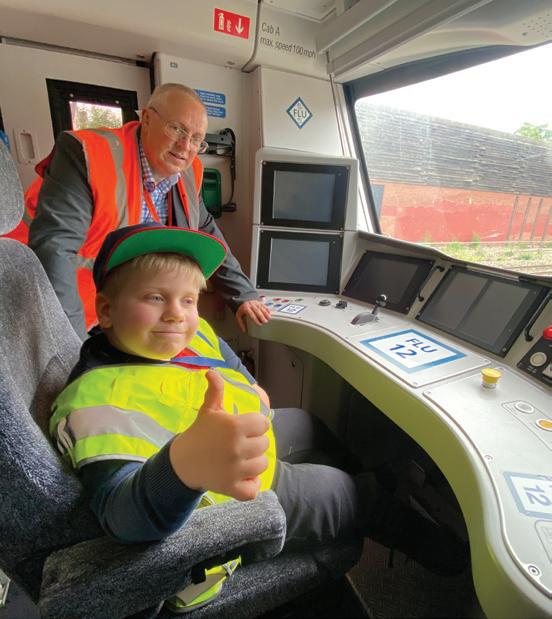
RAILWAY CAT SEEKS BRAND NEW NAME
Staff at train operator Northern are asking passengers to choose a name for a stray cat that has become part of their team in Barrow-in-Furness.
The skinny kitty wandered into the operator’s TrainCare Centre two years ago and decided to stick around after being treated to a meal. The team quickly grew fond of the friendly feline, making sure she has everything she needs. They bought her two beds and routinely chip in for cat food and vet bills.
Affectionately referred to as The Cat, she spends her days chasing mice and napping at the TrainCare Centre, which is open 24 hours a day.
Now, after producing a shortlist
“Welcoming Roxy to our office was the perfect way to build awareness among our team ahead of OxTrail 2024, which we hope is a huge success,” said Oxford Bus Company managing director Luke Marion. of four names - Mooch, Birdie, Sassy, and Debbie - staff are asking passengers to pick the right name for the moggie.
Neil Cornforth, a senior team leader for Northern, said: “Everyone looks after her, even the drivers come down and bring her food. She’s a cracking little cat and she’s really friendly.
“She catches mice around the place and there are a few other cats who try and infiltrate the depot, but she keeps them away because she knows she’s got a good thing here!”
ALFIE’S GREAT DAY OUT ON THE TRAINS
Thameslink made dreams come true for one train-mad eight-yearold when they gave him a ride in the cab of one of their services and helped him to make passenger announcements.
Alfie Palmer uses a wheelchair and revealed he was train-mad during an appearance on a local radio programme. Quick as a flash, Thameslink stepped in and offered Alfie a VIP tour of Luton Airport Parkway station, where he donned a hi-vis and helped make station announcements. And what was Alfie’s verdict? “It was great,” he said. “It was text book! It really has made my dream come true.”
SEEN SOMETHING QUIRKY?
Why not drop us a line at editorial@passengertransport.co.uk
SUBSCRIPTION ORDER FORM All annual subscription rates include delivery by secondclass post, or airmail for overseas. ANNUA L SUBSCRIPTION R ATES 1 year UK: £140 EU & Rest of World: £280 2 year UK: £250 3 year UK: £375 WWW.PASSENGERTRANSPORT.CO.UK N A M E JOB TITLE CO M PANY ADDRESS POSTCODE TEL E M AIL DATE PLEASE START MY SUBSCRIPTION TO PASSENGER TRANSPORT CARD NU M BER SECURITY CODE EXPIRY DATE SIGNATURE I enclose a cheque for £ made payable to Passenger Transport Publishing Limited Please invoice my company (official order enclosed) I authorise you to debit my M astercard/VISA/ M aestro/VISA Electron card. Amount £ PT315 Email: subs@passengertransport.co.uk Return to: Subscriptions, Passenger Transport Publishing Ltd, PO Box 5496, Westbury BA13 9BX
Text book!
28 | 14 June 2024 www.passengertransport.co.uk





























